
THE BUSINESS, TECHNOLOGY & ART OF ANIMATION AND VFX ™ May www.animationmagazine.net The Cat’s Out of the Bag! Mark Dindal Is Back with The Garfield Movie 2024 05 74470 82258 05> $7.95 U.S. Plus: Netflix’s Thelma the Unicorn Jurassic World: Chaos Theory The VFX Magic of IF A Cannes Indie Focus And Much, Much More!
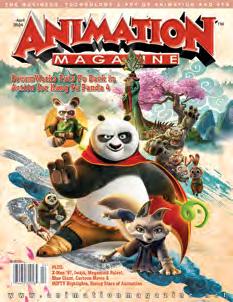
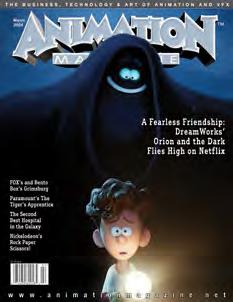


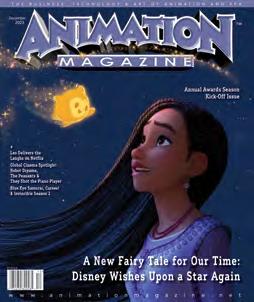
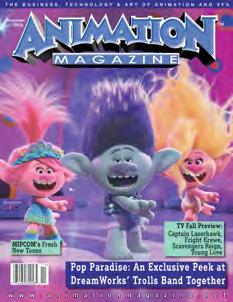
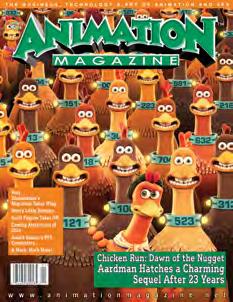
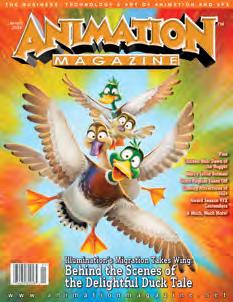
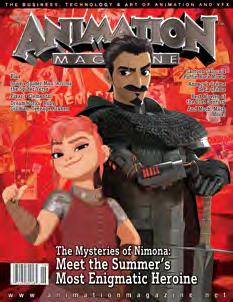
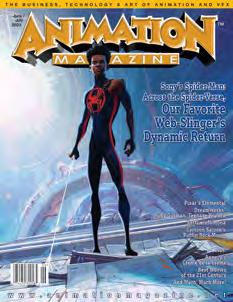

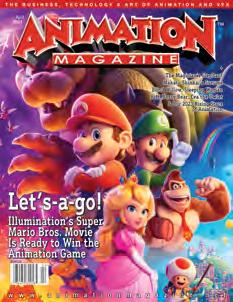

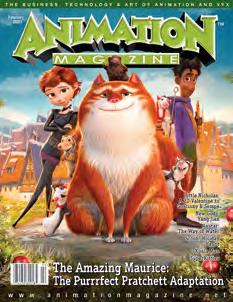
www.animationmagazine.net 2 may 24 All the Animation Highlights at Your Fingertips! Visit our past issue archives and order your copies at www.animationmagazine.net/category/archives/ Which one did you miss?

global animation producers and sales agents discuss their new 2024 titles and the
In which the secrets of Warner Bros./DC’s feature Crisis on Infinite Earths: Part Two will be revealed!
The self-sufficient princess doesn’t need the prince in Creation Entertainment Media’s clever new spin on the famous fairy tale.
Crunchyroll introduces U.S. audiences to the feature based on Tatsuya Endo’s entertaining manga this spring.
The creative forces behind Paramount+’s Knuckles series give us the scoop on the entertaining show.
The kids are older and the stakes are higher in the hot new DreamWorks series Jurassic World: Chaos Theory
Dora and her friends are featured in a splashy new CGanimated series on Paramount+.
Acclaimed Arthur creator Marc Brown introduces young viewers to Hop and his friends.
RETURN OF THE TUBBY TABBY
BORN TO SPARKLE!
Jared Hess and Lynn Wang take us behind the scenes of their magical new Netflix feature, Thelma the Unicorn

SHARP PLAYER
Director Nina Gantz looks back at the making of her award-winning short, Wander to Wonder
The creative forces behind Paramount+’s Knuckles series give us the scoop on the entertaining show.
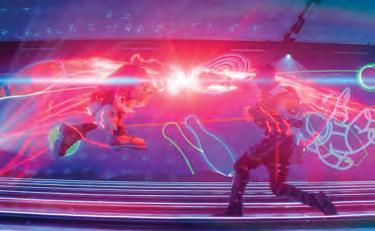
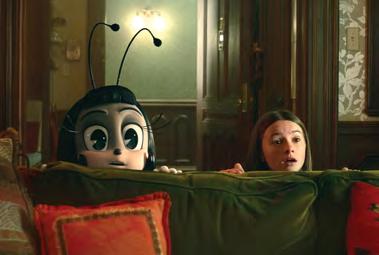
may 24 1 www.animationmagazine.net ANIMATION PLANNER 4 MAY FRAME-BY-FRAME VOLUME 38, ISSUE 5, NUMBER 340 MAY 2024
Mark
Movie delivers a hilarious adventure
beloved selfish cat and his scuffy father. 6 6 FEATURES NOW YOU SEE THEM 36 How VFX supervisor Chris Lawrence, animation supervisor Arslan Elver and the team at Framestore brought IF’s magical creatures to life. 36 COVER: Columbia Pictures and Alcon releases The Garfield Movie in theaters on May 24. Licensing Expo Cover: Cyber Group Studios’ global hit Gigantosaurus Cannes Market Cover: Magic Frame Animation and Creation Entertainment Media bring Rebellious to the market. LAST PAGE DAY IN THE LIFE OF 40 Rough Draft exec Claudia Katz (Futurama) takes us through her animated day. VFX & TECH NOW YOU SEE THEM 36 How VFX supervisor Chris Lawrence, animation supervisor Arslan Elver and the team at Framestore brought IF’s magical creatures to life. TECH REVIEWS 38 JangaFX’s GeoGen and LiquiGen, and Tyson Ibele’s tyFlow. FEATURES RETURN OF THE TUBBY TABBY 6 Director Mark Dindal’s The Garfield Movie delivers a hilarious adventure featuring Jim Davis’ beloved selfish cat and his scuffy father. BORN TO SPARKLE! 10 Jared Hess and Lynn Wang take us behind the scenes of their magical new Netflix feature, Thelma the Unicorn MONSTERS WITH HEART 14 A homeless little ghost and her otherworldly friends share
INDEPENDENTS’ CANNES-DO SPIRIT 16
state
global market. BRIDGING THE BIG BANG 20
Director
Dindal’s The Garfield
featuring Jim Davis’
some timely messages in Elli and Her Monster Team
Top
of the
A TOTALLY MODERN SLEEPING BEAUTY 22
10
10 SHORTS THE EXISTENTIAL ANGST OF PUPPETS 35
26
26 ANIME THE FAMILY THAT SPIES TOGETHER 24
SHARP PLAYER 26
THE RETURN
28
OF THE NUBLAR SIX
¡ELLA ESTÁ DE VUELTA! 30
HEARTS AND SMILES 32
TELEVISION/STREAMING VFX & TECH TELEVISION/STREAMING

The common advice in the arts is to write or draw what you know, and Garfield creator Jim Davis certainly listened to those words: After trying to make it big with his first comic strip Gnorm Gnat in 1973, he realized that readers couldn’t really identify with bugs, so he listened to the advice of his editor. Since he had grown up on a farm with 25 cats in Muncie, Indiana, he centered his next comic on an orange kitty named Garfield, and that’s how the pop culture phenom was born.
The selfish tabby, who is the star of a new CG-animated movie directed by Mark Dindal, is our cover cat this month. Our writer Jeff Spry had a great time interviewing the veteran director and the film’s animation supervisor Jason Boose to find out how they came up with a genuinely fresh take on the popular cat, which also takes us back to his cute kitten days.
It’s only May, but the colorful parade of animated summer movies has officially begun. Netflix is offering Thelma the Unicorn, a charming adaptation of Aaron Blabey’s popular book directed by Jared Hess and Lynn Wang. Our magazine’s longtime contributor Karen Idelson goes behind the scenes of the movie to offer a fascinating read on the making of this inspiring tale which has great things to say about self-worth, identity and the simple joys of being a talented pony
Although the Annecy Festival has become the place to bring all the big animated movies, shorts and TV series, the Cannes Film Festival and Marché du Film continue to attract prestige titles and independent movies trying to find buyers and financing in our constantly changing entertainment landscape. Just before press time, we learned that Latvian filmmaker Gints Zilbalodis’ second feature Flow and Oscar-winning French helmer Michel Hazanavicius’ new title The Most Precious of Cargoes will be screening at the event. In addition, Yōko Kuno and Nobuhiro Yamashita’s Ghost Cat Anzu (which has already been picked up by indie patron saints GKIDS) will screen at the Directors’ Fortnight sidebar. Venerated Japanese animation house Studio Ghibli will receive the prestigious Palm d’Or at the event — the first time the honor has been bestowed to a whole studio. It’s great to see that animation is not an afterthought at this global celebration of cinema.

Festival Felines: Ghost Cat Anzu (top) and Flow will both be featured at the 77th edition of the Cannes Festival this month.

We hope you enjoy this late-spring edition of the magazine. Don’t forget to pick up next month’s issue as well, because it’s our annual summer/Annecy festival special issue, which is always one of our biggest, most jam-packed packages of the whole year! We love diving in to this giant issue almost as much as Garfield loves finishing a tray of lasagna in one bite.

Ramin Zahed Editor in Chief ramin@animationmagazine.net
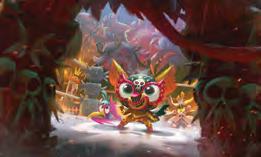
“After Book of Life, Maestro (Guillermo del Toro) told me my second film would be even harder to happen. I didn’t believe him. Ten years later, and I have developed three films (Space Punch, LEGO Billion Brick Race and I, Chihuaha) that for various reasons stalled. And yet, I can’t wait to keep trying. To wield a machete of endless optimism and hope is the only way I know to survive! TO FIGHT ONCE MORE IS A GIFT!”
— Jorge R. Gutierrez on X, after his upcoming movie I, Chihuahua was dropped by Netflix last month.
President & Publisher: Jean Thoren Accounting: Jan Bayouth
EDITORIAL
edit@animationmagazine.net
Editor in Chief: Ramin Zahed
Multimedia Editor: Mercedes Milligan
Webmaster: Damaso Abrajan
Asst. Webmaster: Lucy Abrajan
Tech Reviews Editor: Todd Sheridan Perry
Copy Editor: Jason Sanchez
Contributors: Ryan Gaur, Trevor Hogg, Karen Idelson, Tom McLean, Jeff Spry
ADVERTISING SALES
Sheri Shelton sales@animationmagazine.net
EVENTS Director: Kim Derevlany
kim@animationmagazine.net
CREATIVE
Creative Director/Production Manager: Susanne Rector prod@animationmagazine.net
Circulation Director: Jan Bayouth circ@animationmagazine.net
SUBSCRIPTIONS
For account changes, renewals, cancellations, questions or comments: anics@magserv.com
TO ADVERTISE: Phone: 818-883-2884 Fax: 818-883-3773
Email: sales@animationmagazine.net
Website: www.animationmagazine.net
MAGAZINE (USPS 015-877/ISSN 1041-617X)
www.animationmagazine.net 2 may 24
QUOTE OF THE MONTH
ACCOUNTING/CIRCULATION
Published monthly except for combined issues of June/July and September/October, by Animation Magazine * 24943 Kit Carson Road Calabasas, CA 91302 Periodicals postage paid at Woodland Hills Post Office CA, and additional mailing offices. POSTMASTER: SEND ADDRESS CHANGES TO MAILING ADDRESS: ANIMATION MAGAZINE 26500 W. Agoura Rd. Ste. 102-651 Calabasas, CA 91302 TO SUBSCRIBE: For the U.S., the rate is $60 for 1 year or $95 for 2 years. Rates for Canada and Mexico are US$75 for 1 year or US$120 for 2 years delivered by foreign airmail. Foreign rates are US$90 for 1 year or US$145 for 2 years delivered by foreign airmail. Please allow six to eight weeks for initial delivery. Also available in a digital version for $36 for 1 year or $60 for 2 years. Animation Magazine © 2024 Animation Magazine Prior written approval must be obtained to duplicate any and all contents. The copyrights and trademarks of images featured herein are the property of their respective owners. Animation Magazine acknowledges the creators and copyright holders of the materials mentioned herein, and does not seek to infringe on those rights.
ANIMATION
SUBSCRIPTION CUSTOMER SERVICE Animation Magazine | PO Box 16225 | North Hollywood, CA 91615-6625
Phone: (818) 286-3119
|
anics@magserv.com
MAY 2024 VOL. 38, ISSUE 5, NO. 340 info@animationmagazine.net
FROM THE EDITOR
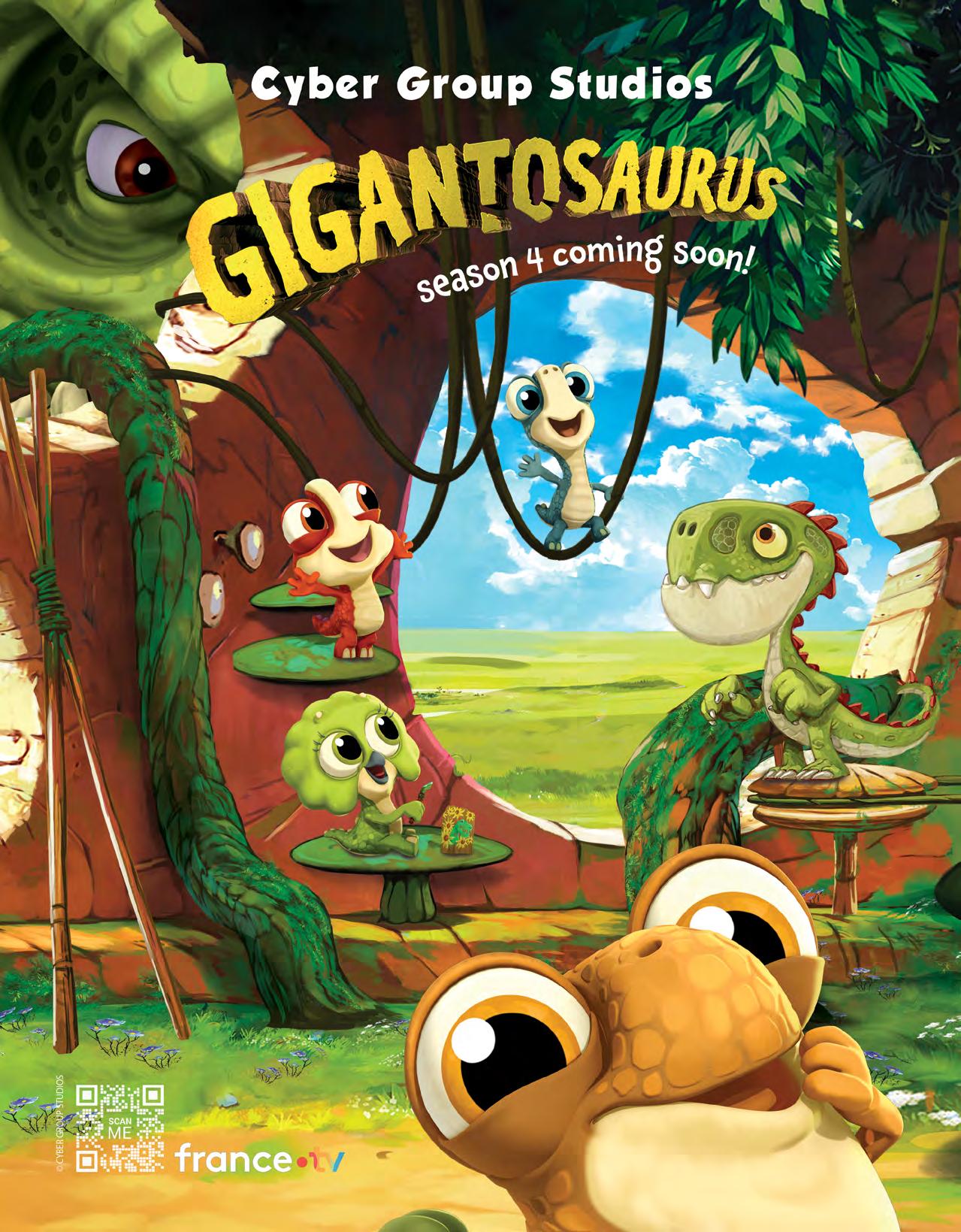
Animation Planner
MAY
3
Jérémie Périn’s Cannes and Annecyselected sci-fi/noir Mars Express launches in NorAm theaters with GKIDS today.
4
It’s Star Wars Day! That means new adventures in a galaxy far, far away in the animated anthology Star Wars: Tales of the Empire on Disney+. (The streamer is also dropping S2 of Monsters at Work tomorrow.) It’s also Free Comic Book Day, so visit comicshoplocator.com to find a participating store near you.
7
Rooster Teeth’s longrunning web series comes to an epic, feature-length conclusion with Red vs. Blue: Restoration, available to purchase from digital platforms today.
9
14
Cannes Film Festival & Market introduces the next wave of international festival darlings over 12 deluxe days. [festival-cannes.com]
17
Another Aaron Blabey book gets an animated makeover in Thelma the Unicorn, the pop-princess-pony tale now on Netflix. In theaters, a cavalcade of stars voice all sorts of imaginary friends in John Krasinski’s hybrid family flick, IF
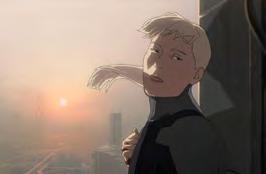

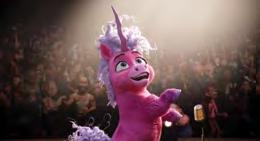


Hades enlists Seraphim to help claim the vacant throne of Olympus in Blood of Zeus Season 2, on Netflix today.

12
Demon Slayer -Kimetsu no Yaiba- Hashira Training Arc brings the next chapter of Tanjiro’s journey exclusively to Crunchyroll.

21
Licensing Expo returns to Las Vegas for three days, gathering 200-plus brand owners in the Mandalay Bay. [licensingexpo.com]
22
Disney+ premieres the BTS documentary Marvel Studios’ Assembled: The Making of X-Men ‘97 today, as well as the uproarious Chip ‘n’ Dale: Park Life S2.
24


Chris Pratt plays another classic character in Columbia/Alcon’s The Garfield Movie, which introduces the orange tabby’s dad voiced by Samuel L. Jackson! Meanwhile, the dino saga continues in Jurassic World: Chaos Theory on Netflix.
31
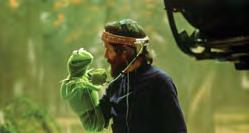
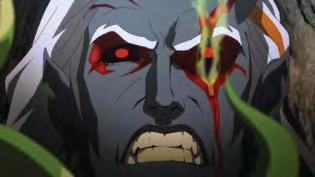
Pablo Berger’s Oscar-nominated Robot Dreams begins its U.S. theatrical run in New York City today. For anime fans, the box-office hit HAIKYU!! The Dumpster Battle also hits NorAm cinemas through Crunchyroll & Sony today. On streaming, Ron Howard’s Jim Henson Idea Man on Disney+ paints a loving portrait of the Muppets creator.
May Animation Festivals
Anifilm | Liberec, Czechia | anifilm.cz
Animayo | Tenerife, Gran Canaria | animayo.com
British Animation Film Festival | London | filmfestivalguild.com
Cartoons on the Bay | Pescara, Italy | cartoonsbay.rai.it
Chilemonos | Santiago, Chile | chilemonos.cl
Melbourne Int’l Animation Festival | Australia | miaf.net
Quirino Awards | Tenerife, Gran Canaria | premiosquirino.org
Trollywood Animation Festival | Trollhättan, Sweden | trollywoodanimation.se
To get your company’s events and products listed in this monthly calendar, please e-mail edit@animationmagazine.net.
www.animationmagazine.net 4 may 24
Mars Express
Star Wars: Tales of the Empire
Red vs. Blue: Restoration
Demon Slayer -Kimetsu no Yaiba- Hashira Training Arc
IF
Blood of Zeus
Thelma the Unicorn
Chip ‘n’ Dale: Park Life
Jurassic World: Chaos Theory
FRAME-BY-FRAME
Jim Henson Idea Man
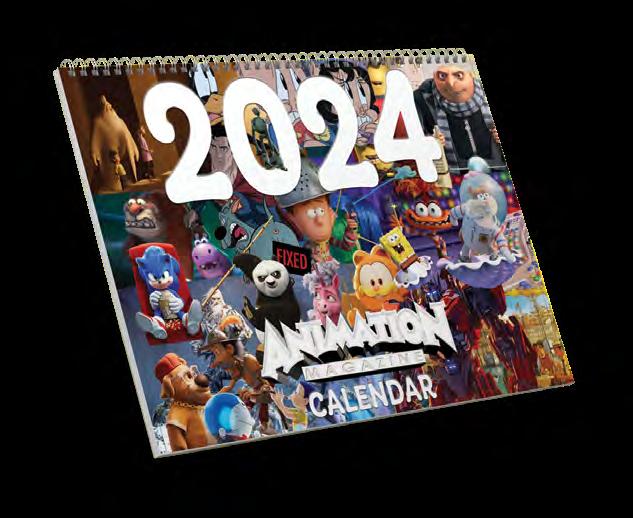
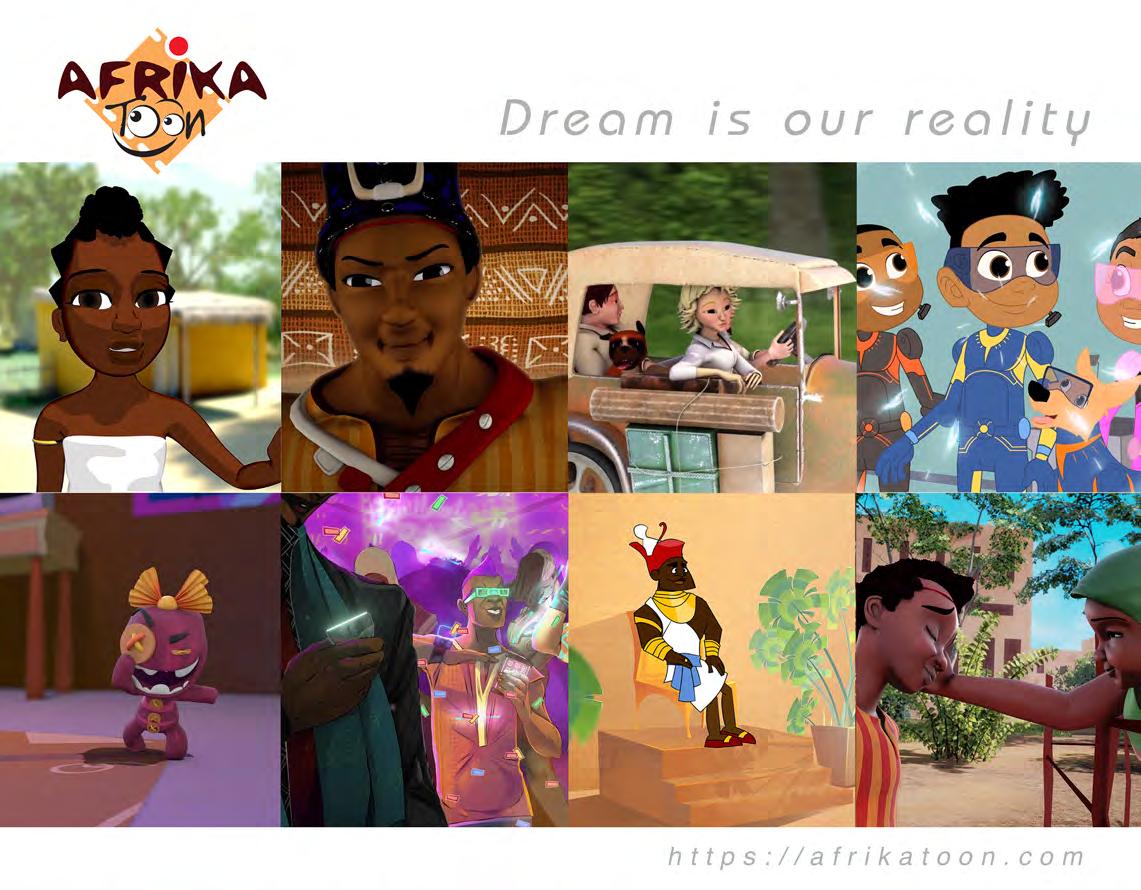
DOWNLOAD NOW animationmagazine.net/calendar/ Our 2024 Animation Trade-Show Calendar Is Here! Keeping track of all the many animation and vfx shows and events each year is a lot easier with Animation Magazine’s annual trade-show calendar. Download our 2024 calendar, filled with great images and helpful info about all your favorite toon events and trade shows of the year.
RetuRn of the tubby tabby
Director Mark Dindal’s The Garfield Movie delivers a hilarious adventure featuring Jim Davis’ beloved selfish cat and his scuffy father.
- By Jeff Spry -
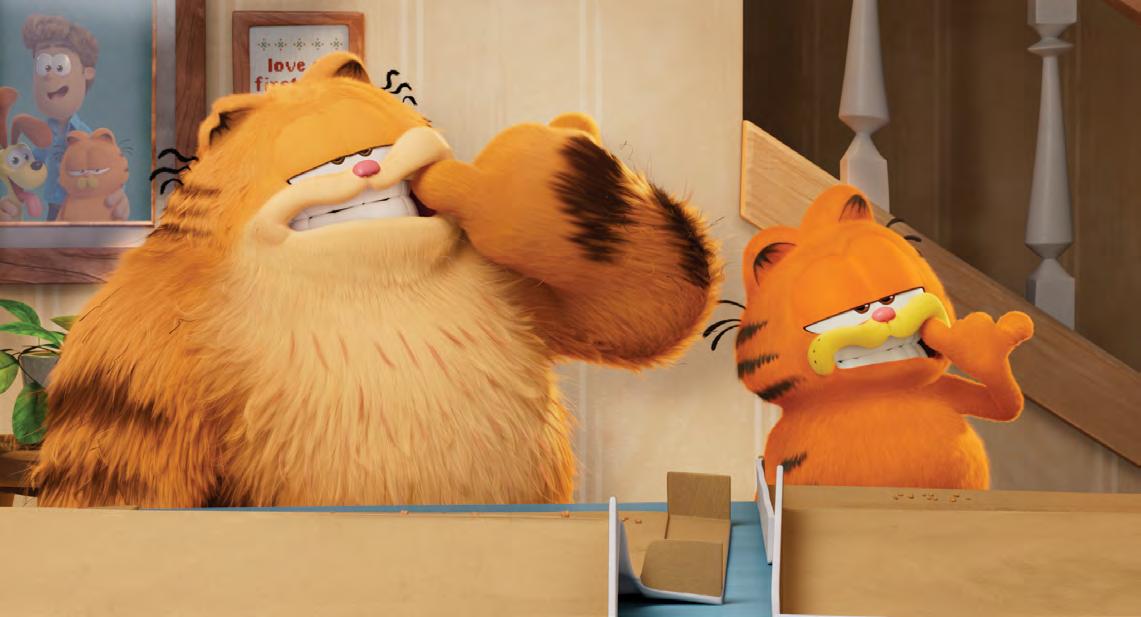
Since his birth in 1978, the lazy, tubby tabby named Garfield has become an institutional pop culture figure akin to other cartoon celebs, such as Snoopy, Bugs Bunny and Mickey Mouse. After scratching his way to stardom and being syndicated in more than 2,800 newspapers, Jim Davis’ furry phenom has been featured in TV specials, calendars, T-shirts and bedsheets for over five decades. This month he is back in The Garfield Movie, a new CG-animated feature released by Columbia Pictures and Alcon Entertainment, animated by DNEG and directed by acclaimed animation veteran Mark Dindal, best known for directing The Emperor’s New Groove and Chicken Little
Presenting such an iconic orange figure to the digital generation required great care and responsibility. Dindal and Jason Boose, his animation supervisor at DNEG, were certainly up to that tall task, crafting a dynamic tale of Garfield’s estranged father, Vic, suddenly reappearing in his leisurely life and asking for his cynical son’s assistance.
Adding to the mayhem are the movie’s vocal stars, Chris Pratt as Garfield and Samuel L. Jack son as Vic, who enlivened the project with their
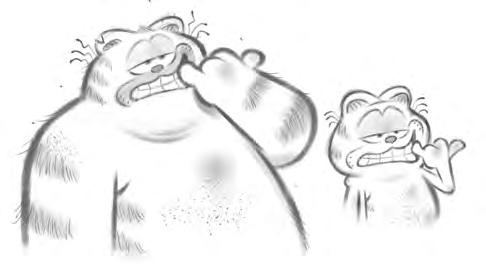
chemistry. Joining them are Brett Goldstein, Bowen Yang, Nicholas Hoult, Hannah Waddingham, Cecily Strong and Ving Rhames.
Pop Cultural Paw Print
“Garfield came out in the newspaper in 1978, so that was the year I went to CalArts in California to study animation,” Dindal tells Animation Magazine. “I was introduced to Garfield in the reverse order of how he was introduced to the world. The television special was in 1982, then I discovered the compilation books, then I saw it in the newspaper. At CalArts we didn’t get the newspaper, there was no internet, nobody had a phone or a TV, so we were cut off from what was happening — until four years later when we were out in the world reconnecting with society. Then there were four years of comics that existed at that point, so Garfield was well established.”

As Dindal began researching the database of comic
www.animationmagazine.net may 24 FEATURES

‘It all started with Jim Davis … Everything we did was to try and honor the world that he created and bring it into this CG world.’
- Director Mark Dindal
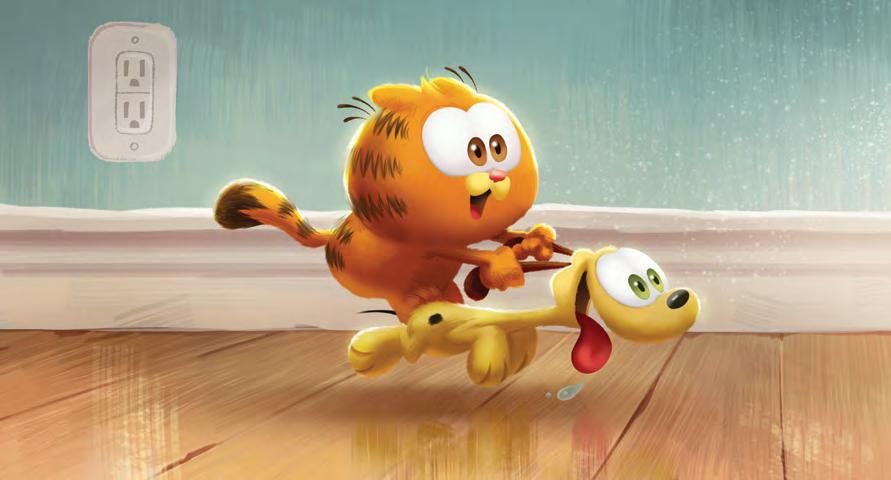
strips, he noticed that you could flip back 10 or 30 years and still see Garfield’s core consistency and continuity.
“It was a conscious thing on Jim Davis’ part to keep him universal and not tied to any current social thing,” says the director. “So that when you look at these comic strips, they’d still seem relevant. It’s that universal quality that connected with people; otherwise, Garfield wouldn’t have stayed around.”
Boose and his crew were responsible for the entire visual performance, covering anything that moves or emotes, and were inspired by the hallowed legacy of this lasagna-loving cartoon cat.
“I loved him in the ’80s,” Boose adds. “My parents are moving out of their house and they’re having a big clear-out. When I was home visiting them, they were making me go through all my old stuff. I used to love Garfield and I found a sketchbook of mine from the ’80s, and it’s full of Garfield drawings. Even some of the drawings I was replicating for this movie. I loved that pose then and I love that pose now.”
The simplicity of the comic strips’ human emotions and commonplace situations is what grounds the source material and helps

MORE THAN NINE LIVES: Jim Davis’s selfish tabby Garfield was first introduced in 1976 in the local comic strip called Jon. Prior to the 2024 movie, the property has been adapted to three TV series, three features and numerous TV specials.
keep Garfield evergreen. Screenwriting duties landed with Finding Nemo’s Oscar-nominated scribe David Reynolds, co-writer of The Emperor’s New Groove, who composed a fun, family-oriented plot with collaborators Paul A. Kaplan and Mark Torgove that greatly expanded Garfield’s usual posse.
“The story basically is an unexpected reunion of Garfield and his irresponsible street cat father, who’s played by Samuel L. Jackson,” Dindal explains. “Upon this reunion Garfield is pulled out of his very comfortable pampered life at home with Jon out into the outside world to join Vic in this high-stakes heist. Garfield is going to come to learn certain things about Vic that he’d made assumptions about and had misjudged [about] him. It’s all about how their relationship is transformed as a result of this adventure.”
Keeping that classic shape language, color palette and character design fans have come to expect was of vital importance, and Boose was diligent in retaining those longstanding poses.
“I can’t speak for Taylor [Krahenbuhl], our brilliant character designer, and Pete [Oswald] and Jeanie [Chang], our production designer and art director, but it all started with Jim Davis,” notes Boose. “Everything was to try and honor the
world that he created and bring it into this CG world. Pete always talked about wanting a painterly, handmade kind of feel — a lot of backlit, very painterly brushstrokes. The backgrounds almost have a look of miniatures, which give it a really unique quality. It’s a perfect setting for Garfield to play out his story.
“Animation-wise, Mark [Dindal] really wanted us to push boundaries with the animation style on this one. We let the emotion and the story drive the animation. Sometimes the movie is very naturalistic and the movement is very relatable. And sometimes it’s crazy, wacky cartoony, like a Tex Avery film. Then sometimes it sort of hovers in between. The story drives everything.”
One of the stylistic influences that emerged early on was the feel that Dindal got as a youngster playing with his View-Master toy.
“I remember wanting to step into that world,” he adds. “Those were in stereo 3D, and we do have the stereo 3D version of Garfield, which I was so excited to see for the first time because it re-creates that feeling of stepping into this environment. But I even get that in the flat version because of the atmosphere Jason [Boose] mentioned, and it just creates a world that I feel like I want to walk around in and explore. I know
may 24 7 www.animationmagazine.net FEATURES
FEATURES

FELINE FOLLIES: Chris Pratt and Harvey Guillen voice Garfield and Odie in the movie, which also features the voices of Samuel L. Jackson (Vic), Hannah Waddingham (Jinx), Ving Rhames (Otto), Nicholas Hoult (Jon), Brett Goldstein (Roland) and Snoop Dog (Snoop Catt!).
that it’s not real, but it feels so real.”
Scoring such talents as Chris Pratt and Samuel L. Jackson to play Garfield and Vic was a godsend, and the A-list performers relished their time in the recording booth finding the two cats’ voices.
“We started with a clip of Chris Pratt from a talk show early on when we were experimenting with different actors, and we’d cut sound bites to the storyboard drawings to see if that voice would fit the character,” recalls Dindal. “He was talking about a restaurant or eating, and it just seemed to fit so well. Then I had a phone conversation with him, and he said, ‘Yeah. I know this character. I enjoy food and eating. I can relate to this guy.’”
He adds, “We wanted to have a foot in the Garfield that everybody knows, but this movie is also going to explore further dimensions of the character, and the demand for the acting was going to have quite a range. He’s pulled out of his comfort zone, so we’re going to see him not in control and devastated and panicked and worried and afraid. I felt Chris knew all of that,

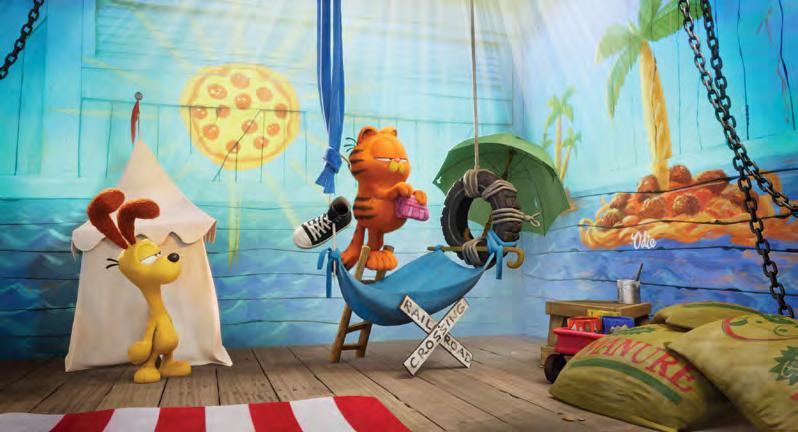
and I was very excited for him to see how he’d handle those different emotions. It’s always fun to see how they embody the character. We’d get some many wonderful choices on every scene.”
For Samuel L. Jackson’s scruffy father, Dindal encouraged the energetic actor to embrace the freedom to create a new character in the Garfield universe by ad-libbing and making it his own.
“He just hit it. And I knew he would be able to do that. Then it was just a matter of going through the scenes and telling him the context so he knew where he was in the story and where he was in the relationship, and we’d just sit in awe and watch these people work.”
Preserving and respecting the 45-year history of Garfield on this new feature provided not only the creative motivation for everyone involved but also extreme gratification.
Perfectly Posed
“We would always refer back to the original Jim Davis poses of Garfield whenever we could,
and we really wanted to honor what he’d done because his drawings are beautiful,” notes Boose. “I loved them as a kid, but I actually appreciate them even more as a professional when you look back and realize there was so much skill in what he did. So anytime we could hit one of those iconic Garfield poses — that deadpan, sardonic Garfield that we all know, love and remember — we’d do it. The most fun was working with Mark; he’s an animator’s dream as a director.”
As Dindal reflects deeply on the whole experience, he believes that the most rewarding aspect is always the crew he’s working with. “It’s such a long production schedule that if that’s miserable it’s going to be unbearable,” he says. “The process is just fun for me. I’m happy to say that after all these years it’s always fresh and new. When you see it finally done and you’re pleased, the result is icing on the cake.” ◆
Columbia Pictures and Alcon will release The Garfield Movie in theaters nationwide on May 23.
‘Anytime we could hit one of those iconic Garfield poses — that deadpan, sardonic Garfield that we all know, love and remember — we’d do it.’
- Animation supervisor Jason Boose
www.animationmagazine.net 8 may 24
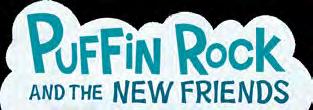
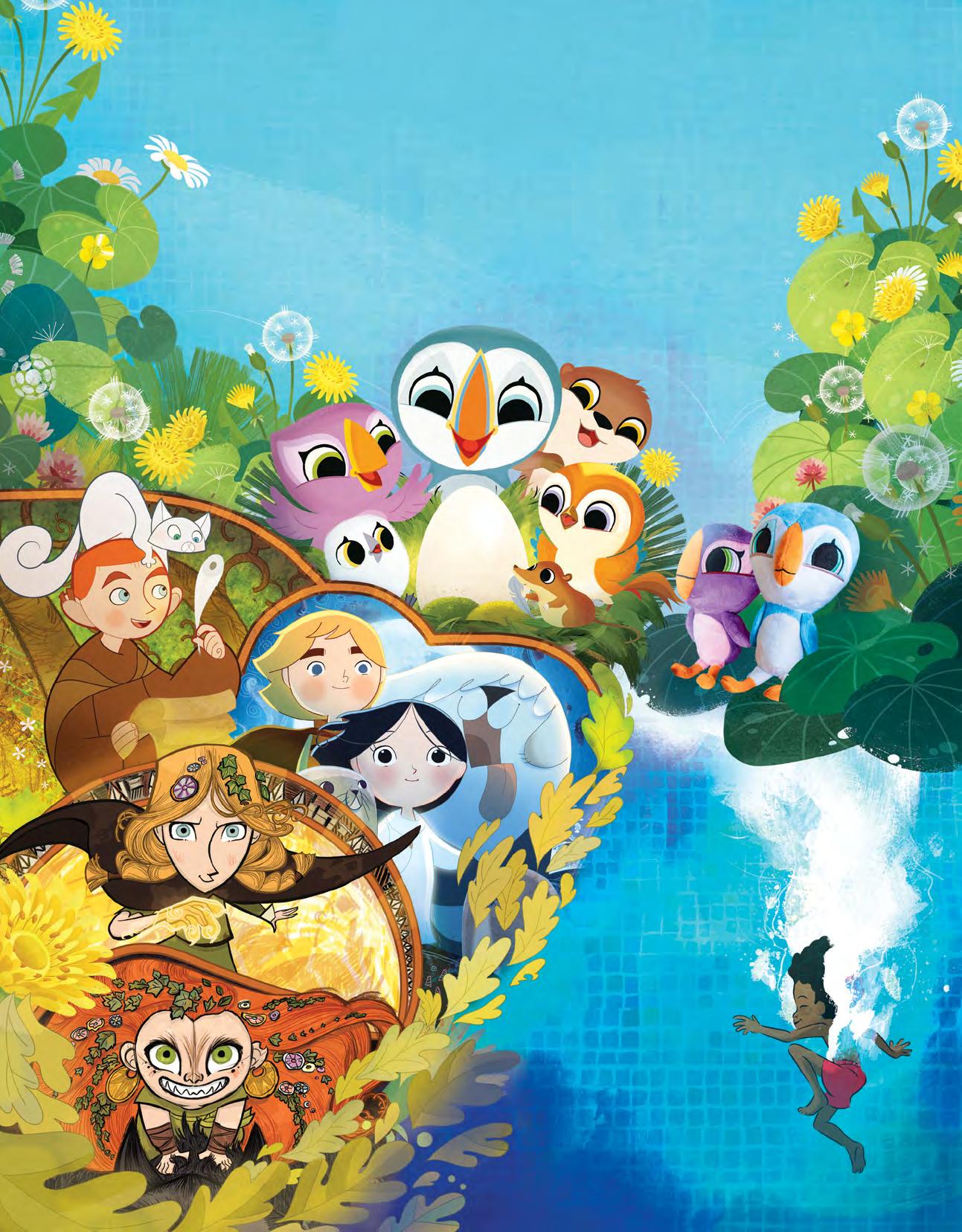

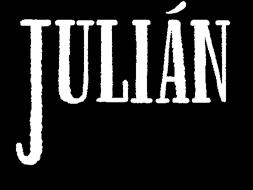
coming in 2025 Licensing . Brian Tyrrell . brian.tyrrell@cartoonsaloon.ie Film sales . West End Films . info@westendfilms.com
Born to Sparkle!
Jared Hess and Lynn Wang take us behind the scenes of their magical new Netflix feature, Thelma the Unicorn.
- By Karen Idelson -

Fans of Aaron Blabey’s Thelma the Unicorn books get a special treat this month when the comedy movie musical inspired by the series lands on Netflix. Just as imagined in the original story, which was first published in 2017, we follow a spirited unicorn with a dream to become a famous — and sparkly — pop star.
The CG-animated feature is directed by Jared Hess (Masterminds, The Last Man on Earth) and Lynn Wang (Unikitty!) and written by Hess and his wife, Jerusha Hess (Napoleon Dynamite, Nacho Libre). Blabey and Patrick Hughes of Foundation Media Partners are executive producers. The film’s produced by animation veteran Pam Coats, whose credits include Mulan and Scoob!
According to the filmmakers, they fell in love
with Thelma after reading the books. They thought her struggle to be loved for herself would resonate with kids and parents alike. It also made Hess reflect on his own family.
Style and Substance
When it came time to take the story from Blabey’s book to the screen, they made few changes. “Aaron Blabey’s book is pretty perfect,” says Hess. “The characters and themes are so strong and the visual storytelling is clear and full of personality. We wanted to maintain that same spirit in all of our character designs. But once we cast Brittany Howard as Thelma, her music, personality and style affected every aspect of bringing Thelma to life. Like Aaron’s illustrations, we wanted Thelma’s character design to be instantly lovable but also reflect the style of a true artist and stand

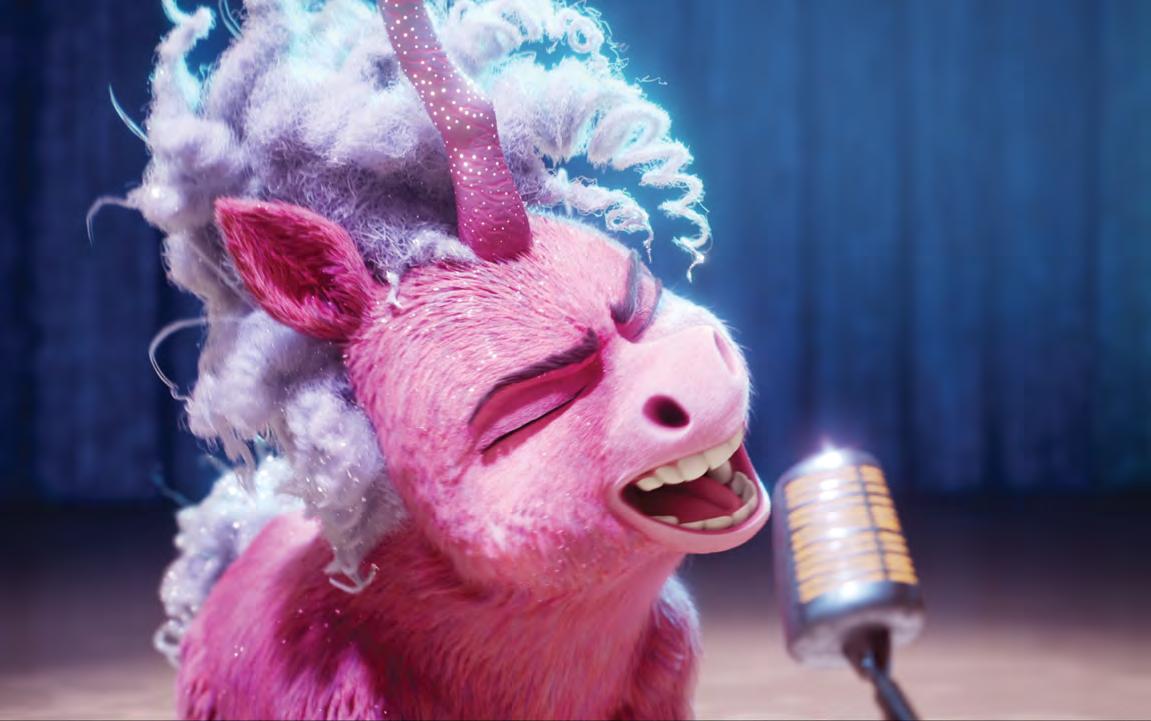
out from everyone else in the film. We based Thelma’s hairstyle on one that Brittany has rocked before. We also decided to make her a two-toned painted horse. But even with all those changes her character remained true to the book.”
Hess, Wang and Coats aimed to keep Thelma adorable and engaging while she goes on a quest for her sense of self. They leaned into her playful and unusual qualities to make her relatable to the audience.
“The illustrations from the books are so funny, and the phrase that we kept bringing up over and over again while we were making this movie was ‘funny on sight,’” says Wang. “That really stemmed from Jared’s library of his work and also to Aaron Blabey’s own illustrations. I think anytime you look at them, they’re just so funny. We’ve really tried to keep
FEATURES

‘We wanted Thelma’s character design to be instantly lovable but also reflect the style of a true artist and stand out from everyone else in the film.’
- Director Jared Hess




that alive while translating it to the movie. So we wanted the characters to look diverse and funny and quirky, and you want to laugh at them, but you want to celebrate the quirkiness as well. That was really important to us.”
She adds, “We wanted to keep Thema’s really short stature. I think Aaron (Blabey) made these drawings and illustrations really tactile, and they’re very contextual. We really wanted it to feel like you wanted to reach out and touch it. So we wanted to bring that over as
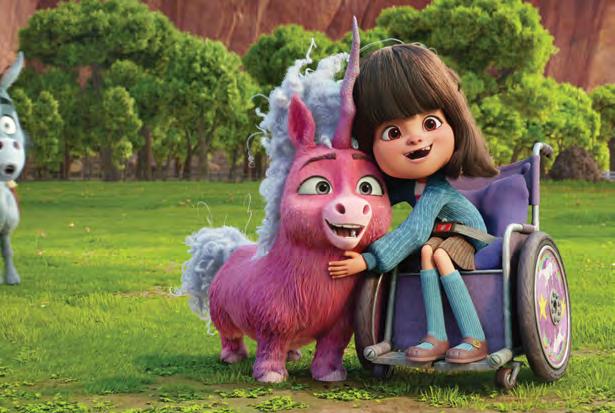
well and make sure it fit into a 3D space.”
With so much to draw from in the books, the crew was thrilled to begin production when suddenly the pandemic hit and they had to switch gears from in-person meetings to online. During the transition the crew had virtual mixers as well as production gatherings. And their animation partner came on ready to move the production along.
“The animation was done by the wonderful team of artists at Mikros — most of them
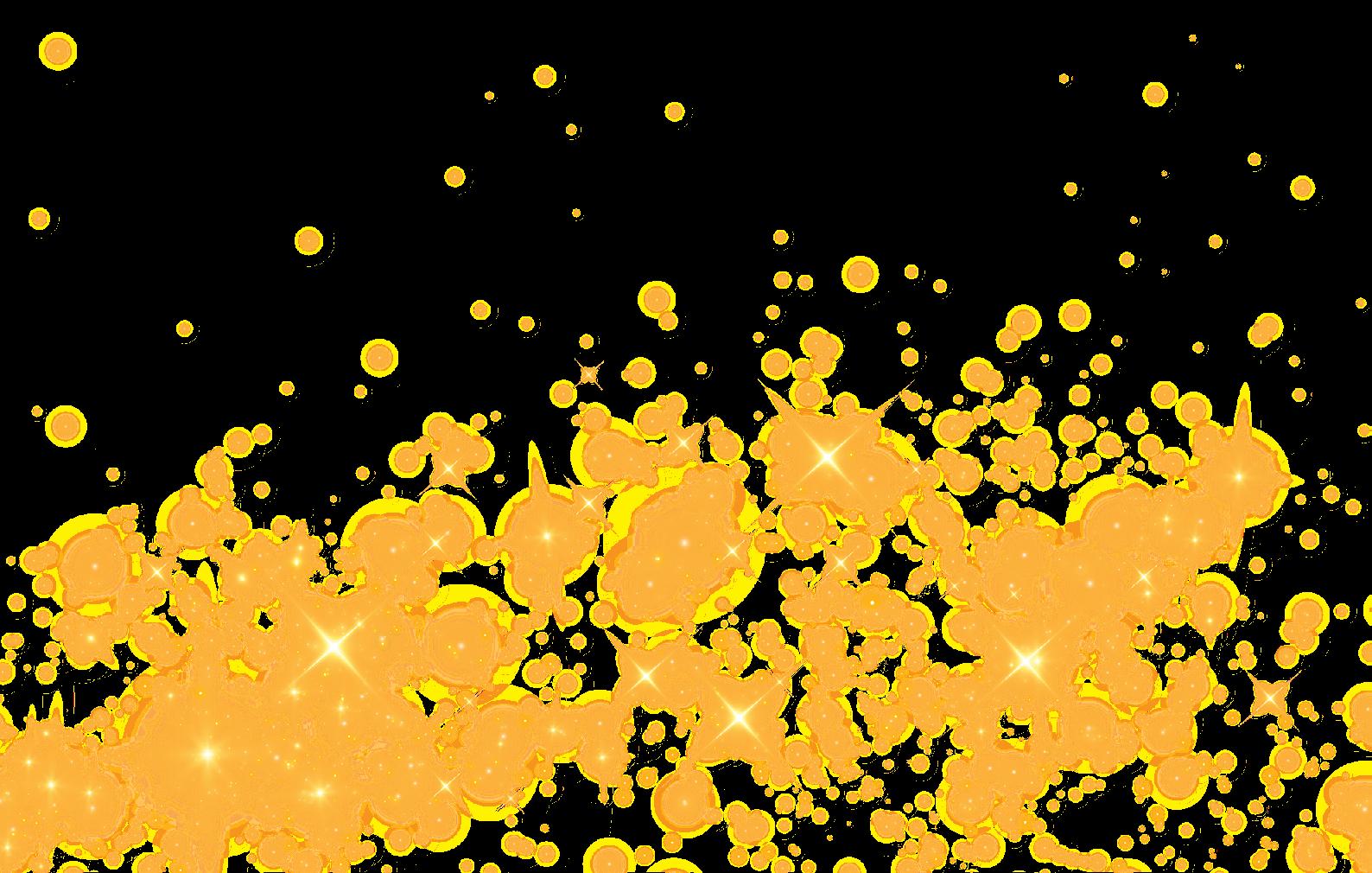
working out of offices in Montreal, Bengaluru and Paris,” says Hess, who along with his wife was nominated for an Oscar early this year for their short Ninety-Five Senses. “The crew was huge. We started production during the pandemic and so this entire movie was basically made over Zoom meetings. I can’t wait to meet some of these talented folks in person someday. Even though we were just thumbnails on a screen, our producer Pam (Coats) always found ways to throw killer Zoom parties
SING YOUR OWN SONG: Based on the book by Aaron Blabey, Thelma the Unicorn centers on a talented pony (voiced by Brittany Howard) who dreams of being a glamorous musical star. Will Forte, Jemaine Clement, Edi Patterson, Maliaka Mitchell, Fred Armisen, Zach Galifianakis and Jon Heder round up the terrific voice cast.


and make everyone feel like we were in the same room.”
Thelma the Unicorn also boasts a voice cast full of notable names giving memorable performances. Brittany Howard, Grammy winner and songwriter for the band Alabama Shakes, is Thelma; Jemaine Clement voices Vic Diamond; Zach Galifianakis is Crusty Trucker; and Fred Armisen is Danny Stallion. Will Forte, Jon Heder and Edi Patterson also voice Otis, Reggie and Megan, respectively.
Since the story is about a character who wants to become famous through her music, it was critical to have someone play Thelma who had a very strong musical background. That decision also influenced the film’s songs.
“Once Brittany Howard came on board, her music became the inspiration for Thelma,” says Hess. “It was critical to have the music feel authentic to Brittany as a performer — so we spent a lot of time coming up with the right songs that really showcased her vocal prowess. Brittany worked closely with our amazing music producer, Mike Elizondo, as well as songwriters Bret McKenzie and Taura Stinson.” Hess points out that the film features a nice variety of music styles. “We had to establish

HARMONIC CONVERGENCE: The specific musical style and personality of Brittany Howard made a big impact on the development of Thelma as a stand-out character. Composer John Powell, music supervisor Morgan Rhodes and music producer Mike Elizondo also played key roles in creating the film’s unique aural landscape.
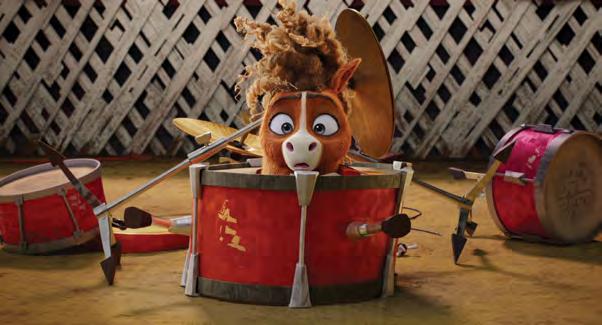
Thelma’s unique voice early on and then show how it gets corrupted by stardom. Our music supervisor, Morgan Rhodes, was instrumental in helping us create Thelma’s distinct musical journey. Both Mike and Brittany Howard are based in Nashville and were able to record everything at his studio. Bret McKenzie’s comedy sensibility was a perfect match for our film, and John Powell did the beautiful score for the film. I have been a fan of his forever; his heartfelt themes totally changed the emotional journey for Thelma.”
Since many of the songs were recorded during the COVID pandemic, the production had to be extremely cautious to protect everyone. Cast and crew were given test kits before recording. Coats says Howard and Elizondo would create songs in what seemed like no time at all in his Nashville studio because they seemed to know exactly how to put the songs together.
Magical Melodies
Powell recorded the score for the movie in one of the most famous and iconic locations in the world — Abbey Road Studios in London. The studio has hosted such rock and
luminaries as the Beatles, Pink Floyd, Kate Bush, Radiohead, Oasis, Lady Gaga and Adele, among many others.
“(John Powell) loves Abbey Road,” says Coats. “And there are two main theaters — stages — there and he wanted to record in both because the movie has a cacophony of different sorts of choices. He picked out certain cues to record inside “A,” which is where the Beatles recorded, and then bigger orchestral cues to record out on a bigger stage. That was fun just watching his process about, you know, what he was looking for, including what kind of piano was being played.”
Looking back on the production Hess, Wang and Coats felt fortunate to be able to bring such a talented crew and cast together just as the pandemic was starting. Together they were able to bring Thelma to life in a new way. “We were so lucky that Brittany signed on to play Thelma,” says Hess. “I think it was a big leap of faith on her part. She obviously sings like an angel, but her acting chops floored us again and again.”
Thelma the Unicorn will trot along to Netflix on May 17.
www.animationmagazine.net 12 may 24
pop
◆

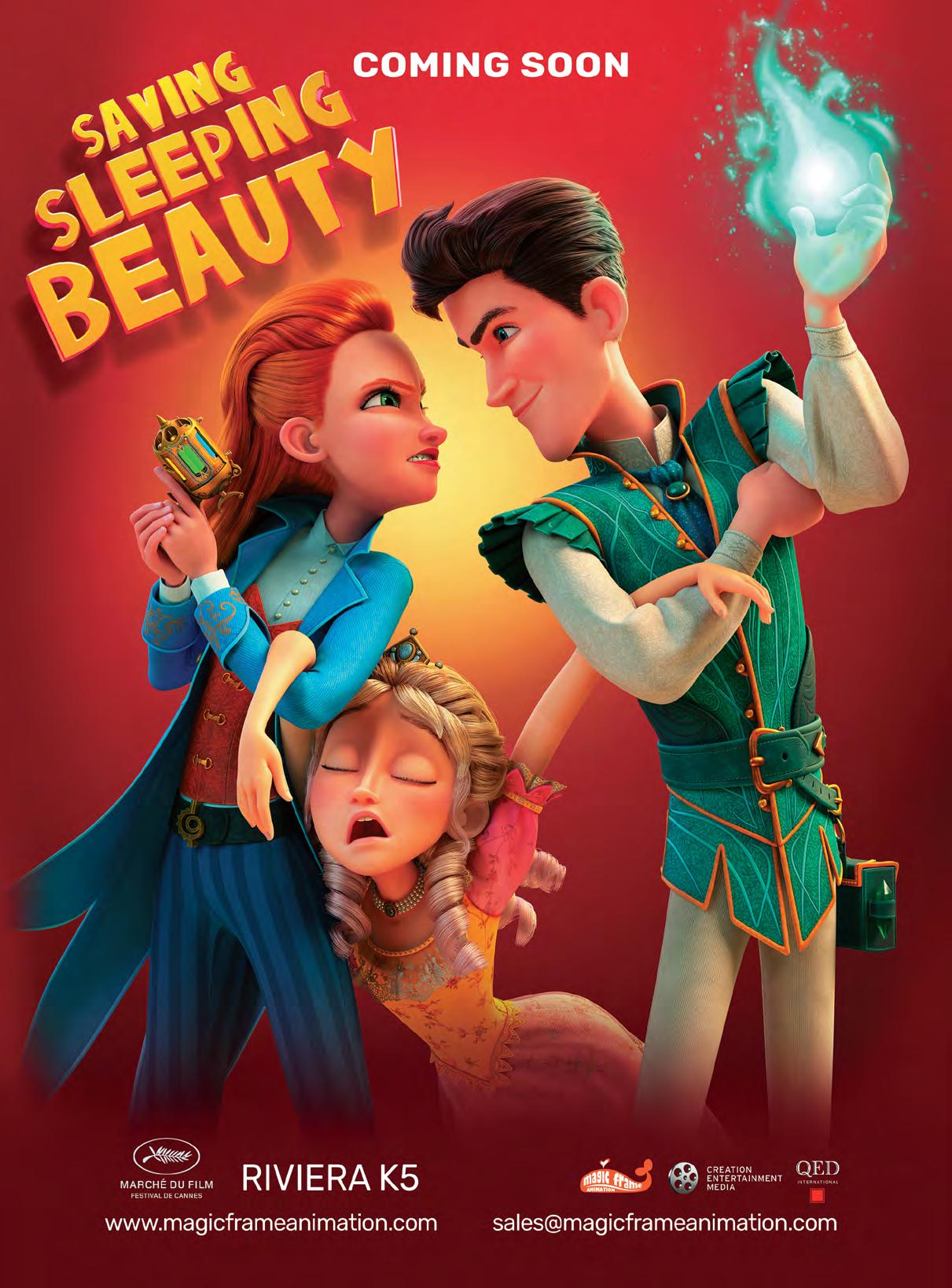
FEATURES
Monsters with Heart
A homeless little ghost and her otherworldly friends share some timely messages in Elli and Her Monster Team!
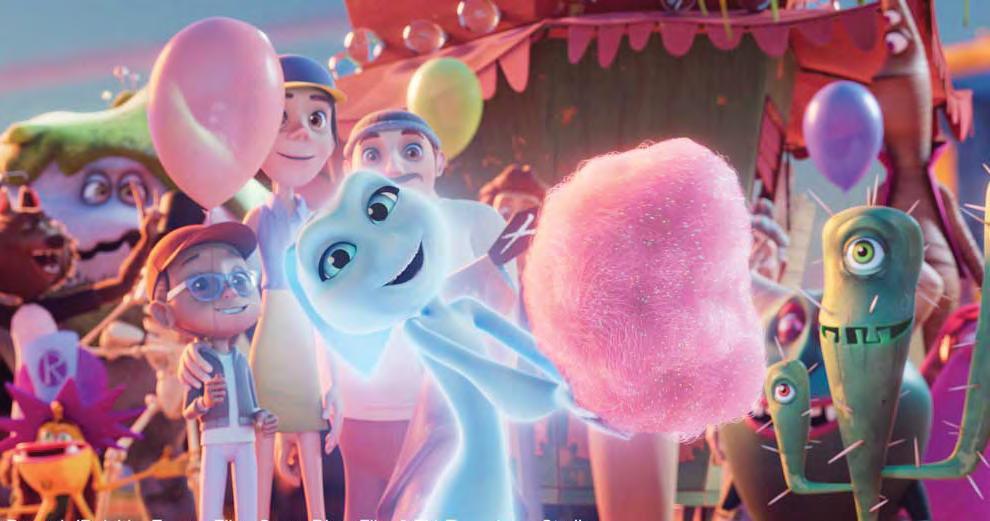
Afriendly blue ghost named Elli finds a new family and a place to belong in Elli and Her Monster Team!, a charming new CG-animated feature, directed by European veterans Jesper Møller (Asterix and the Vikings) and Piet de Rycker (Laura’s Star) and co-directed by Jens Møller (Lego Star Wars: The Freemaker Adventures). The feature, which is produced by Germany’s Sooper Film and Dreamin’ Dolphin made a splash at the European Film Market and will also be taken to the Cannes Market by Pink Parrot Media. Jesper Møller, who has worked on movies such as All Dogs Go to Heaven, FernGully: The Last Rainforest and Eight Crazy Nights, was kind enough to answer a few of our questions about his latest feature, which is based on the best-selling book by Klaus Baumgart, the popular German author who also wrote Laura’s Star.
Bluth Studio Buddies
“My co-director, Piet, whom I met back in 1990 when we both worked as animators on Don Bluth’s studio in Dublin, contacted me and our producer Lilian Klages back in 2016
with the idea of adapting Baumgart’s children book Elli, a Monstrous Secret as an animated movie for the entire family,” he recalls. “We both immediately liked not only the idea but also the crazy ambition. Piet teamed up with me as co-writer and director and from there onwards, it has been eight years of intense creativity, financing, writing, visual development and finally – full production!”
The talented animation master says he loves pretty much everything about the movie. “This is a beautiful, hilarious, eccentric and emotionally intense movie,” Møller notes. “But what has given me the biggest joy and satisfaction is that we succeeded to visualize and follow through with our vision to create an animated movie that claims its very own visual identity with a truly unique story and a BIG heart to go with it.”
When asked about the film’s animation style, the director says the story and its main characters determined the overall approach and visual development. “We wanted it to be old-school and familiar in terms of relatability, for example in the case of Elli’s mansion where she lives in the start of the movie,” he explains. “However, we were still after the ‘larger than life’ feel that
is one of the strengths of the best animated movies. The same was true for our Big City, where we wanted to have a futuristic feel, in terms of technology, design and everyday objects like self-driving cars and such.”
He adds, “At the same time, it was important for us that the city should still feel relatable to the present, so we had to make sure that it didn’t feel like a ‘space city’ but like a city of yesterday that had grown into a city of tomorrow. Of course, with the Quantrix Tower protruding in the city center, which contains the most power ful computer in the world, the meta-theme of AI and the looming threat of it taking control, can not be missed!”
The animation production, which was han dled by the talented teams in Germany, Can ada and India, was done in Blender and had a ballpark budget of 12 million euros (around $12.7 million).
“Making an animated feature film is always an ambitious endeavor, some might say brave, may be even crazy, and as a beginner’ it can be very intimidating,” admits Møller. “No doubt that our

www.animationmagazine.net 14
©2024 Dreamin’ Dolphin Film/Zooper Film/Productions CARPEDIEM (V) Inc./Traumhaus Studios

‘Perhaps the film’s message that is dearest to all our hearts is “you choose your real family with your heart.”’
- Director Jesper Møller
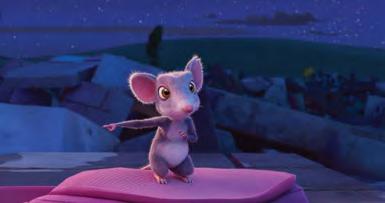
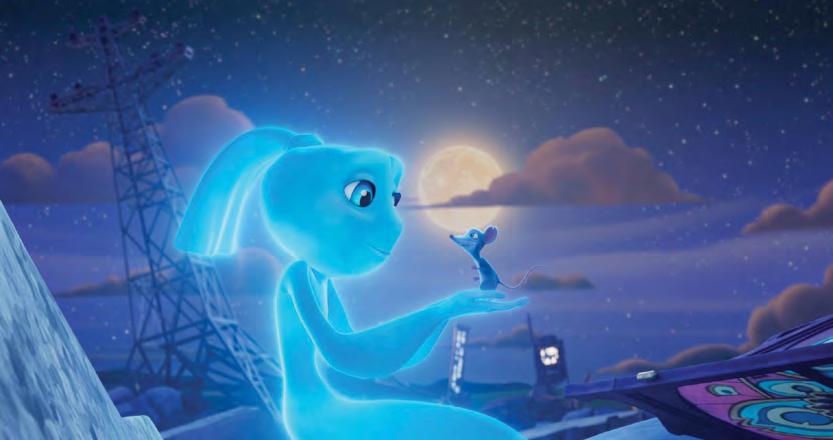
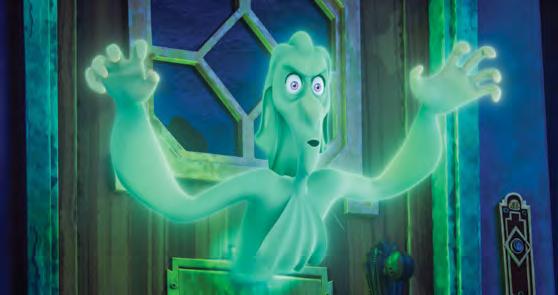
A SPIRITED HEROINE: Based on the book by Baumhaus Verlag, Elli and Her Monster
will premiere in Germany and Canada in June.
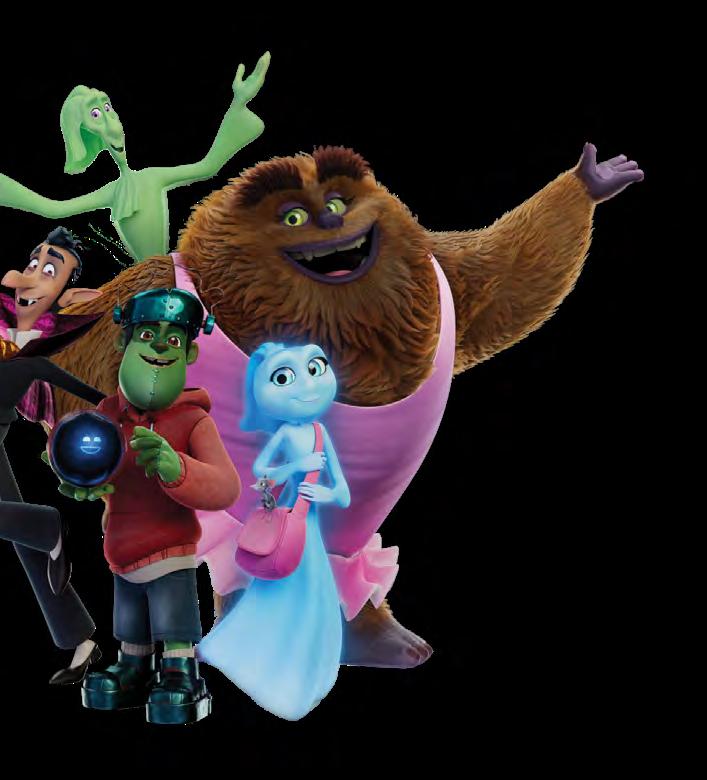
unfold a story that was compelling and strong enough to ensure a sincere and entertaining cinematic experience,” he explains. “With our experience, we knew it would be possible – but it is always an organic process, and many things evolve out of the creative process itself, as do all the unforeseen obstacles as well, of course. This was also an international co-production, so that offers its own share of challenges.”
The creative team behind the movie is ready for the world to experience the magic of Elli, when it premieres in Germany in June, and begins its worldwide rollout this summer. Møller believes the family film works on many levels. “It touches quite a few themes that we believe are not only important but also relatable for both children and grown-ups everywhere,” he concludes. “There’s the theme of the danger of carelessly handing over too much power to technology can be fatal for life as we know it. But more important, there is a very central message about respect and inclusion and the danger of dividing our world into ‘them and us.’ Finally, and perhaps the film’s message that is dearest to all our hearts is “you choose your real family with your heart.” ◆
Elli and Her Monster Team! will be released in Germany on June 26. The film is co-produced by Zooper Film, Dreamin’ Dolphin, Carpediem Film & TV and Traumhaus Studios.
www.animationmagazine.net FEATURES
Team!
Independents’ Cannes-Do Spirit
Top global animation producers and sales agents discuss their new 2024 titles and the state of the global market.
Michael Ryan, Partner/Producer, GFM Film Sales
The Cannes/Annecy Slate: Among the movies on our slate this year are the eagerly anticipated Warner Bros. movie, The Day the Earth Blew Up: A Looney Tunes Movie, 10 Lives (which premiered at Sundance earlier this year), Ozi: Voice of the Forest (produced by Leonardo DiCaprio), Stitch Head (Steve Hudson’s adaptation of the popular book series) and Sneaks (Rob Edwards’ tale of misplaced sneakers that end up lost in New York City, “with the biggest hip-hop voice cast you’ve ever seen in your life!”). Thoughts on the Looney Tunes Movie: I guess it’s an unusual situation to be asked by Warner Bros. to distribute the movie that they’ve made. I did it many, many years ago with Pee-Wee’s Big Adventure Having had that reputation is what led them to trust us with it. It’s an honor because it’s never been done before. It’s the first original animated Looney Tunes feature. What can be better than Daffy Duck and Porky Pig, really? I guess Warner Bros. is concentrating their efforts on their big tentpole movies. When I was asked whether it should go straight to Warner’s TV or pay-per-view, I said, “Hang on. This has a life of its own, outside of the Warner Bros.’ mainstream. It’s a great 90-year IP that has never been done as a feature. For us in the indie world, it’s a very big deal!” It would be a great shame to send it straight to streaming. It’s really, really good. It’s like the old-fashioned Warner Bros. cartoons in style and color. When people watch it, I hope it will take them to their childhood. It’s not what they’re used to from their great tentpoles. It’s an original piece and done in a traditional way. We’ve already sold it and done very well with it. We’re going to screen it in Cannes and will also take it to Annecy as well.

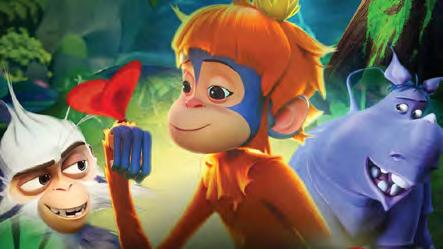
On the 2024 Titles: It’s an exciting time for us. We have a lot of good things happen. We are showing something from Sneaks for the first time, and it has some great stuff in it.
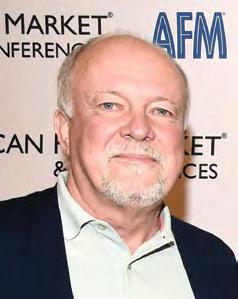

The movie will be delivered by the end of summer. We’re having a great time with Humbugged, a new adaptation of Charles Dickens’ A Christmas Carol, which is told from the point of view of the ghost of Marley. Stitch Head is very unusual as well. It’s the adaptation of a series of six books by English author Guy Bass. It will raise a few eyebrows. We can screen Ozi in full because it’s all done.
The overall state of the industry: I think it’s coming back. The attendance in Cannes seems to be very heavy this year — much better than 2023. I think the big theatrical features are faring much better. Some of the smaller titles are struggling a bit, but we are slowly ticking up each year because we deal with bigger theatricals. We have some big animated movies this year. Whenever people ask how do we make this business work, my answer is “You make a very good movie!” People forget that sometimes. If you’ve done that, the rest is up to marketing and international distributors. This year, we are seeing good results in international markets and all the European territories. People will go to the cinemas to see a movie if it’s good.
www.animationmagazine.net 16 may 24 FEATURES
Ozi
Stitch Head
Klaus Rasmussen
Co-Head of Intl. Sales and Acquisitions, Global Screen
FEATURES
Animated Titles at Cannes: Our animated film Niko: Beyond the Northern Lights will be completed for Cannes and will be shown to distributors for the very first time at the Cannes market. We have already presold the film in most parts of the world, including the U.S. and U.K., but we still have territories open in Australia, Israel and Asia (excluding South Korea). This Nordic/German/Irish co-prod will have its national premiere in Finland on October 11 and then be released from November to January, coinciding with the holiday season. Additionally, we have The Last Whale Singer, a German, Czech, Canadian co-production, which is set to be completed for summer 2025. With a strong script and appealing promo, we have already presold to many territories. For AFM 2024, we expect to have the first completed scenes ready to show distributors. I love that both Niko and The Last Whale Singer boast very high animation quality, as well as engaging storytelling and positive messages and values for children.
Thoughts on the global market: The international theatrical market for animated films is robust, but independent animations must meet high commercial standards to compete with major studios like Pixar. Our films consistently perform in the top 10 at the box office worldwide.
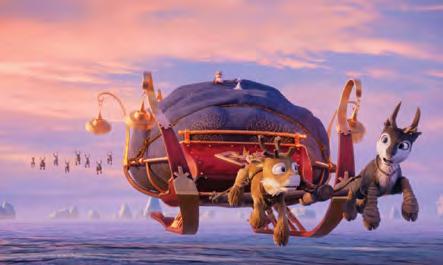


The road ahead: One major challenge for smaller distributors is finding a gap in the crowded yearly release schedule and securing space for their animation film before studio animations takes all the attention with their films.
Key survival strategies: It’s important for us sales agents to work with animated producers who really know how to handle the craft of animation. It seems at the moment that everybody wants to make animation films, but many films get lost in the process since it takes a long time from start to end, and you need good skills and experience to get a film completed on time.
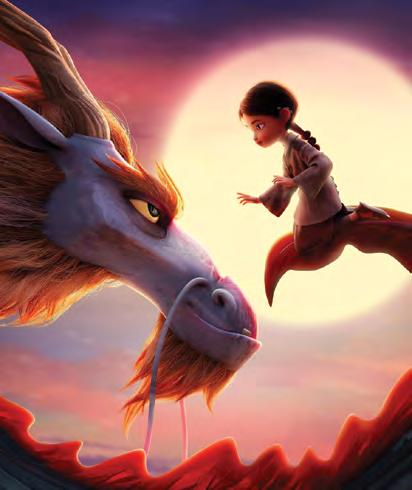
 Simon Crowe Managing Director, SC Films
Simon Crowe Managing Director, SC Films
The 2024 Slate: SC continues to plan the worldwide release for Dragonkeeper (directed by Jianping Li and Salvador Simó) and updating on Girl in the Clouds (directed by Philippe Riche). Dragonkeeper is an epic tale that is visually bold and the story is beautifully told. Girl in the Clouds is fun escapism with a very funny guinea pig as the main character’s sidekick.
The current market: It is tricky but there is always demand for quality animated features. Good stories that are well told are the key. The challenges ahead? Difficult markets like the U.S. (due to the cost of releasing), China and S. Korea. And AI is coming fast with new innovations.
Survival strategies: You have to focus on commercial, key projects. Getting them funded and into production, and keeping the budgets tight!
may 24 17 www.animationmagazine.net
Dragonkeeper
Niko: Beyond the Northern Lights
The Last Whale Singer
FEATURES
Rodney Uhler Director of Acquisitions and Developments, GKIDS
On the current market: The challenges that face the broader film industry are the ones that affect animated features as well: bigger importance and reliance on “big” titles, more challenging market for smaller, indie titles, and uncertainty with streamer and platform appetite. However, I feel incredibly optimistic about the current market for animation since what is important, the quality of films being produced, doesn’t seem to be impacted by this situation. It means our job as distributors and producers is to be more creative and figure out better ways to ensure the most exciting films get made and find the audiences they deserve. Trendspotting: Something we’re particularly encouraged (and motivated) by is the audiences’ desire to see iconic titles from the past in a theatrical setting. We recently presented the first ever North American theatrical release of The End of Evangelion and it exceeded our expectations. Each year we keep expanding the Ghibli Fest offerings due to audience demand. Last year’s re-release of Coraline was a big success too. These are all encouraging as a sign that there is still clear power and interest in seeing a great film in a theatrical setting.
On the GKIDS’ slate: I love that we’re back to celebrating European animation, particularly French animation, this year with three new titles (Chicken for Linda, Mars Express and Sirocco and the Kingdom of Winds). Each title is so unique that it highlights how one country can produce such a diverse variety of storytelling. We fell in love with each of these films for different reasons and are excited to share them with audiences in North America.
Survival tips: I’d encourage productions of any size to look towards international co-production opportunities whenever possible, I feel strongly it’s a benefit not just in terms of potential financial opportunities but for creative input as well. Animation can have a wide, global reach so thinking exclusively in terms of the domestic audience or market wherever the film is being made is excluding a wide range of opportunities.
Marie-Claude Beauchamp President/Producer; CarpeDiem/Pink Parrot Media

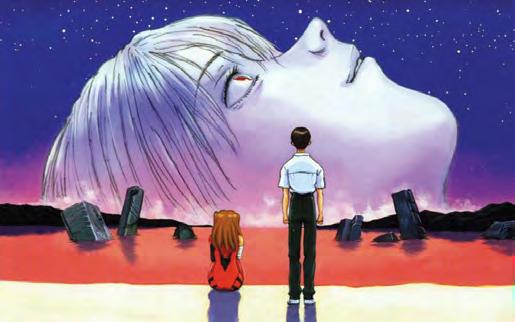
New Titles: CarpeDiem recently finished our animated movie Butterfly Tale. We started selling it through Pink Parrot Media, our worldwide Sales Agent, during the financing stages a few years back and officially launched it at AFM last November. Some territories are still yet to be sold, such as Asia and LatAm. We will focus on these during the Cannes Film Market as well as Annecy’s MIFA. We’re also concluding another animated feature in co-pro with German producers Zooper Films/Dreaming Dolphin Films titled Elli and Her Monster Team! We are a minority co-producer on this picture, but handle the worldwide sales through our company Pink Parrot Media.


Stand-Out Qualities: These two films have stories that touch the heart and prompt families to discuss important subjects with their kids while being thoroughly entertaining and fun. At CarpeDiem, we have a commercial approach to filmmaking. All of our films, or films that we coproduce, have to carry the 3 H’s: Heart, Humor, and Hugability. We prioritize this approach to meet the interests of our audience and engage them in conversations about subjects that must be addressed in their development.
The year ahead: The two pictures we are about to start are two very different films, but again, two pictures that will bring so much joy to families. The production process is my favorite; working with the directors, writers, and all the creative teams is my most favorite part of the whole process. I especially like working with the directors on the musical aspect of the film. It is another entry point for our audience to express their sense of belonging to our films.
The big picture: The post-pandemic theatrical release calendar was very busy for family films. Many pictures were held back, and the opportunity to release with a fair window was limited. But we believe this is behind us, and more space will be available for releasing family animated pictures. Both strikes (actors and writers) had a bigger impact on the live-action sector than on independent animation films (produced outside the studios).
www.animationmagazine.net 18 may 24
End of Evangelion
Butterfly Tale
Johannes Busse
Head of Sales, Sola Pictures
The Cannes/Annecy Slate: We have Tafiti — Across the Desert, a German animated feature with a $10 million budget and amazing animation quality. The director Nina Wells has previously worked on Latte and the Magic Waterstone and My Fairy Troublemaker, and animation director Timo Berg worked on huge Hollywood titles such as The Mario Bros. Movie, Sing, Pets and Despicable Me 3. We also have the first moving images from the German feature The Super Elfkins (budget $9.7 million) which will released by Tobis Film in Germany in December. It’s a sequel to the first Elfkins movie. Also, we are presenting The Lost Tiger which features the voice of social media star Celeste Barber, which will be released by Universal in 2025.
On the Market: There is a lot of animation on the market. It really is a buyer’s market at the moment which means that high quality and a great marketing package are more important than ever. While the studio animations are still dominating in the market there are good opportunities for high quality independent animations. For us, Europe has recovered quite well after the pandemic and it is a robust market for animated features.
Challenges Ahead: There’s a tendency for stories to be more generic and “safe bets.” The major challenge is to develop and to find new, original stories that have a lot of commercial potential and are a successful mix of original storytelling approaches and proven concepts that engage audiences worldwide.

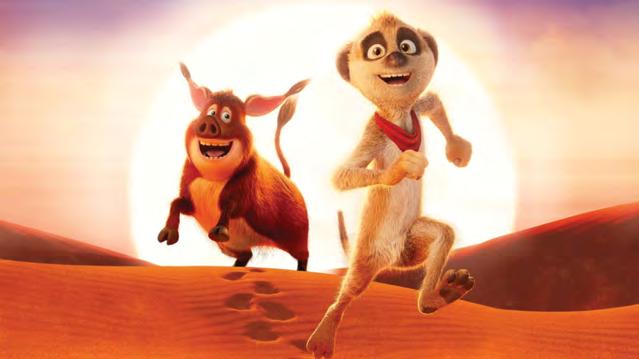
Key survival strategies: It’s more important than ever to differentiate yourself with great animation quality and very good storytelling. Movies with an original, entertaining, and touching stories are in high demand. It’s important have a great marketing package that presents the movie very well.
Laura Pieto VP Content Acquisitions/Partner, Viva Pictures
On the Markets: The Cannes Film Festival is the perfect place to meet again with partners with whom we have a long history of successes and releases but also to discover some hidden gems that suddenly appear almost unexpectedly. Marché du Film is where our theatrical success The Amazing Maurice deal was cooked, and we hope to find another Viva hit this market.
Upcoming Slate: We are very excited for the rest of 2024, particularly our film 200% Wolf slated to release in theaters on Aug. 23.


The Global Scene: The last few years have been marked somewhat by a limited number of films, which always creates tensions in the market and a certain degree of compromise. Fortunately, this phase seems to have passed and we are facing a time in which not only are there more films but their quality has improved substantially, which is always good news for industry professionals and audiences.
Biggest challenges: We often find that filmmakers must seek a balance between responding to the tastes and needs of their country of origin and that which will maximize marketability of their films internationally. We work closely with our producers and sales agents to ensure that films achieve their full potential artistically and financially.
Best part of the job: Seeing how animation projects continually improve at a dizzying pace. Not only is the technical quality of the films much better, the storylines are becoming more complex and sophisticated, allowing more moments of family co-viewing. As parents, we also enjoy animated films and of course want to spend more time with our kids. It’s with this mind that Viva is offering exhibitors the “Kiddo Kompanion Pass.” When a ticket is purchased for a child, exhibitors can provide a second child’s ticket at no additional cost. ◆
may 24 19 www.animationmagazine.net FEATURES
Tafiti - Across the Desert
Bridging the Big Bang
In which the secrets of Warner Bros./DC’s feature Crisis on Infinite Earths: Part Two will be revealed!
- By Tom McLean -

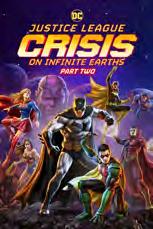
It’s the ultimate movie trailer cliché: “Worlds will live, worlds will die.” But there’s one story that phrase falls short of accurately describing: the 1984-85 DC Comics maxiseries Crisis on Infinite Earths by writer Marv Wolfman and artist George Pérez. In its 12-issue run, Crisis streamlined DC’s messy, multiversal continuity into a single universe by destroying many Earths and merging the survivors into a single world. When it was over, DC’s relaunched its iconic characters into a universe where they’ve thrived and continued to grow ever since.
Adapting this legendary comic book tale’s dense plot and vast multitude of characters into animation is a huge project, one that Warner Bros. Animation is executing over a trilogy. Justice League: Crisis on Infinite Earths: Part One arrived in early 2024, and Part Two was released April 23. Part Three will arrive later this year to wrap up the trilogy, which Warner describes as the beginning of the end of the Tomorrowverse phase of DC animated features that began with 2020’s Superman: Man of Tomorrow. An all-star cast is returning for Part Two with Jensen Ackles as Batman, Emmy winner Darren Criss as Superman and Earth-2 Superman, Meg Donnelly as Supergirl and Harbinger and Stana Katic as Wonder Woman and Superwoman. It’s produced by Jim
Krieg and Kimberly S. Moreau and executive produced by Butch Lukic, Sam Register and Michael Uslan. The film is directed by Jeff Wamester based on a script by Krieg.
A Story that Made Sense
With Part Two bridging the exposition and setup of Part One while also preparing the audience for the climax in Part Three, it was a tricky script to write. “We have to move the story forward, end in a cliffhanger, but still somehow tell a story with a beginning, middle and end — which I hope we did,” Krieg says.
Adapting a comic that’s famous for its dense plotting and intricate continuity into an animated feature posed some challenges. “We tried to keep in all the major moments fans remembered and then fill in story in between those moments in the way that made the most sense,” Krieg says.
That meant finding a version of the story that works for the audience for an animated version 40 years after the original was published. “With Crisis on Infinite Earths, the story was so sprawling — and also specifically about the DC characters who were around at the time — we felt we had to pare down the script to characters who are important to a contemporary audience, for the most part,” he says.
Although the Flash’s relationship with Iris West formed the spine of Part One, the second chapter turns to Supergirl, the Monitor and an obscure but important DC character called Psycho-Pirate. There was a little more freedom to play with those characters than DC’s better-known icons.
“Psycho-Pirate has such a weird, complicated comic book backstory that it’s a mystery to most fans, so that seemed like an opportunity to create a history for him that would make sense for our story,” Krieg says. “And even Supergirl, who made such an impression in Legion of Super-Heroes; we meet her in flashback, right after the loss of Krypton, so she’s a bit of a blank slate. The Batman sections of Part Two deal with the contrast between


www.animationmagazine.net 20 may 24 FEATURES

‘We were designing a lot of the characters in those previous movies so it wouldn’t kill our budget when we got here, but there were still a lot of characters to design that we never were able to use in the previous seven movies.’
- Producer Butch Lukic
his rather rich, complex family life that comics fans know about and the rather sad, solitary existence he leads in the Tomorrowverse.”
The challenge of adapting a story of such scope to animation was only partly alleviated by making it into three movies, Lukic says. “The budget isn’t larger for more characters than any other animated movie we have done, except for a larger budget for the voice cast,” he says. “Our FX budget was probably bigger, but everything else — character design, backgrounds, (story)boards, animation — was the same. Everyone had to do more work in those departments for the same pay.”
The production process for the feature was like previous Tomorrowverse projects. Krieg’s script was handed off to storyboard artists, whose work was turned into an animatic that cut tightly before being sent to overseas animation studios. “Scenes with no animation happening at all, like in-be-
tween dialogue pauses, we usually cut, and when we get the animation back we can stretch the footage back out to where we need it,” Lukic says.
Character designers for previous Tomorrowverse projects kept in mind that the series was leading to adapting Crisis. “We were designing a lot of the characters in those previous movies so it wouldn’t kill our budget when we got here, but there were still a lot of characters to design that we never were able to use in the previous seven movies,” Lukic says.
The style of Crisis’ animation matches the overall look of the Tomorrowverse. “I went for a thicker, tapered-line style, opposite of the deadline normal style, so it’s more of a comic book look,” Lukic says. “It was tough. Some of the studios got it, some didn’t, so it was some work revising their animation when it didn’t fit.”
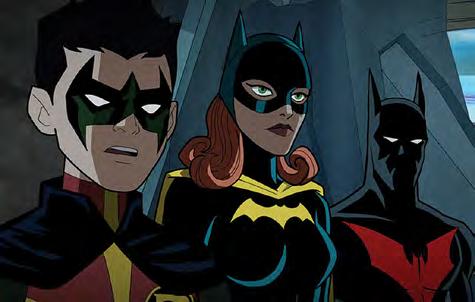
CALLING ALL DC
HEROES: An endless army of shadow demons threatens to destroy the world and all parallel Earths in the new Warner Bros. feature Justice League: Crisis on Infinite Earths, Part Two.
Lukic eschewed the use of 3D modeling software, such as SketchUp, for creating backgrounds. “I went for traditional layouts — freehand. It has [a] more organic look and feel,” he says. “I also shadowed most of the backgrounds before they went to paint, determining where I wanted specific shadows to lay and where the light source was coming from.”
That not only gave the compositions more weight but it also gave the movie a more cinematic feel, Lukic says. “I wanted the board guys and the director to use the full widescreen composition — not have charac-
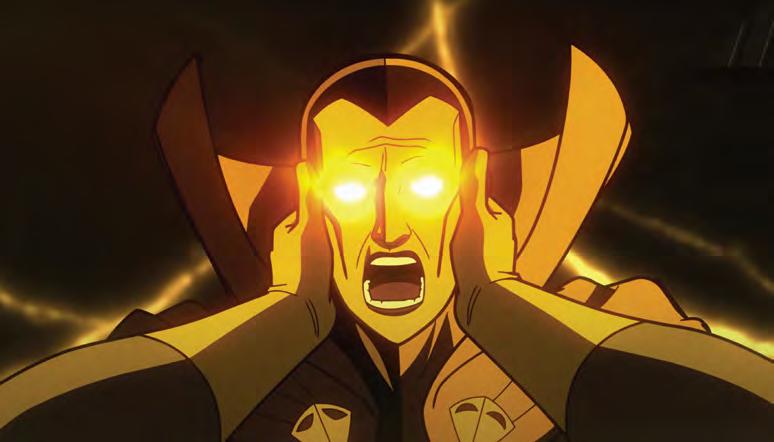
ters generally in the middle of the shot — and use foreground elements to give more depth to your shots.”
Although the comic is known for its massive battle and crowd scenes — one of the hallmarks of the work of the late George Pérez — the movie avoided that as much as possible for logistical and budget reasons. “It was necessary to pick your shots that really needed it and, with that, limit the overall animation necessary for those scenes.”
Real Talk
Another way the production tried to keep the sometimes-abstract storyline relatable was with more realistic and restrained dialogue. “Virtually every event in this movie is so vast, epic and overthe-top that, honestly, it’s not very relatable,” Krieg says. “Giving the characters dialogue that they might actually say in a normal situation, like joking in line at the grocery store or something, makes the impossible stakes somehow more believable.”
Fans so far have appreciated Part One of the animated Crisis, but Krieg says he was happy to get approval from Wolfman and Pérez, the creators of the original classic, at a lunch meeting a few years back — before Pérez’s death in 2022.
“We pitched them what we had, including the changes for streamlining, and they couldn’t have been more gracious and enthusiastic,” Krieg says. “They told us that their version still exists and the movie will likely only create an opportunity for new readers to experience it. It was really wonderful to get their stamp of approval.” ◆
Justice League: Crisis on Infinite Earths: Part One and Two are currently available on Prime Video, AppleTV, Google Play and Vudu.
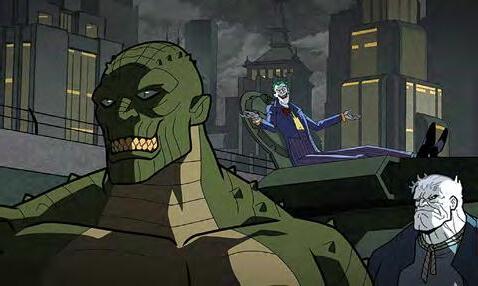
may 24 21 www.animationmagazine.net FEATURES
A Totally Modern Sleeping Beauty
The self-sufficient princess doesn’t need the prince in Creation Entertainment Media’s clever new spin on the famous fairy tale.
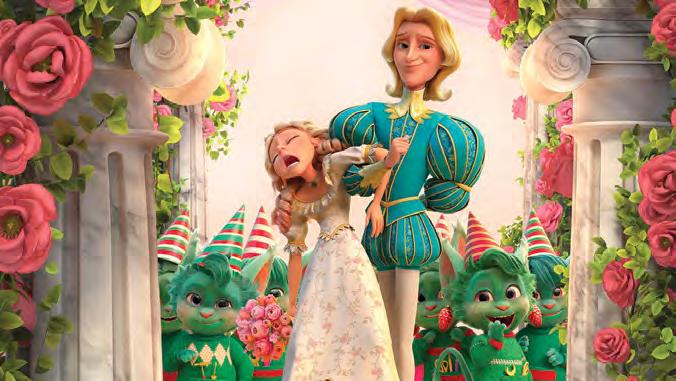
Creation Entertainment is updating a beloved French fairy tale for today’s savvy audiences. The U.K.-based studio, behind animated projects as Secret Magic Control Agency, Rebellious: Mission Rescue and Buddybots, will be bringing its new title Saving Sleeping Beauty to the Cannes Market this month. The new movie is exec produced by Creation Ent. Media CEO Sefi Carmel (Legacy of Lies, Secret Magic Control Agency) and Sasha Shapiro (Dirty Grandpa, District 9) and directed by Alex Tsitsilin (Secret Magic Control Agency).
“Undoubtedly, there’s quite a high demand for adaptations of classic fairy tales both inside the industry and from audiences, despite the fact they have been adapted more than a thousand times in various countries, languages and formats,” says Carmel. “The upcoming film Saving Sleeping Beauty, co-produced with our longterm partners QED Entertainment and our new production associates, Magic Frame Animation, offers unique spin on a remake. The writers Analisa LaBianco (Beverly Hills Chihuahua, Tom and Jerry in New York) and Jeffery Spencer (Secret Magic Control Agency) have been attached



to the project since 2021 when the idea was pitched for the first time. We’re very excited to continue our journey with both of them.
Carmel says the movie embraces the need for inclusivity and representation. ”We introduce a diverse array of characters, including some well-known characters from beloved stories, who interact in a new imaginary universe,” he points out. “We have taken the classic ‘prince saves princess’ Sleeping Beauty narrative and modified the story to include our own re-imagined version. By delving deeper into the original storyline, we were able to breathe new life into some other familiar characters too! For example, our film also features familiar characters like Santa Claus, Ali Baba and the Forty Thieves, and the witches of Oz, in a new, creative setting!”
The new movie’s fantastic universe also includes Hansel and Gretel, who are now working as clever secret agent. “They are actually working together to save the princess from her enchanted slumber,” says Carmel. “But when they cross paths with a sorcery-wielding Prince who is after the same prize, Gretel finds herself battling with the most powerful
force she’s ever experienced — that’s true love.
Carmel, who is is an award-winning London based composer, sound designer, producer and mixer, praises the globally minded production team of artists and technicians. “Our new film is a global collaborative project produced in a borderless environment, with creatives working from Cyprus, Turkey, Spain, France, the United States, the U.K, Brazil, Canada,” he says. “Working with such an international team gives us a unique advantage of retelling centuries-old tales bringing them to the modern values with acceptance between people, cultures and lifestyles. And being relatable in any part of the world is something that’s very important to us as a creative collective. Hats off to Magic Frame Animation team for their outstanding adaptability and consistently excellent work in every frame! The exquisite animation delivered by this team has been the key to the success of the project!” ◆
Saving Sleeping Beauty will screen at film markets this year and will be delivered in full in 2025. For more info, visit creationentertainment.media and magicframeanimation.com.
‘We have taken the classic “prince saves princess” narrative and modified the story to include our own re-imagined version. By delving deeper into the original storyline, we were able to breathe new life into some other familiar characters.’
- Producer Sefi Carmel
www.animationmagazine.net 22 may 24 FEATURES


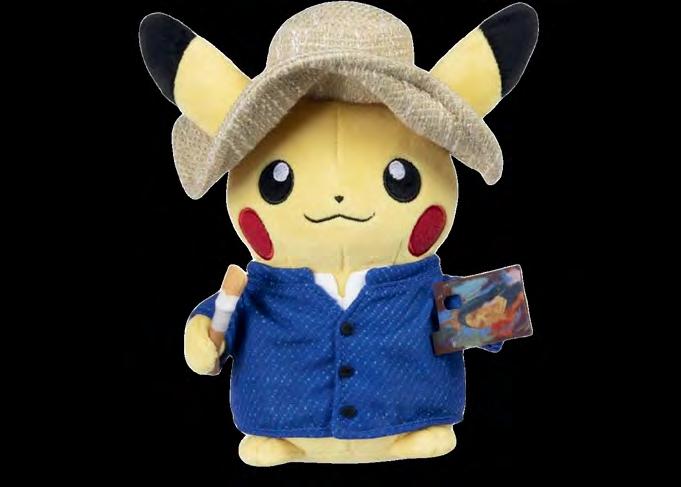



REGISTER NOW OFFICIAL PUBLICATION SECURE RIGHTS TO THE BRANDS YOUR CONSUMERS LOVE
The Family That Spies Together
Crunchyroll introduces U.S. audiences to the feature based on Tatsuya Endo’s entertaining manga this spring.
- By Jeff Spry -

Within the constellation of popular titles that exist in the vast Japanese manga and anime universe, few shine brighter than Tatsuya Endo’s humorous espionage creation, Spy x Family. First introduced as a smash manga series written and drawn by Endo in 2019, this wild super-spy offering has attained the sort of loyal following that might make most comic books blush: It has enjoyed a total circulation of 30 million copies over its brief fiveyear history, and this spring its die-hard fans can enjoy a new animated feature film based on the treasured franchise.
The movie, which is titled Spy x Family Code: White, opened in theaters in Japan last December. Thanks to Crunchyroll and Sony Pictures Entertainment, it also arrived on U.S. screens this spring (in its original Japanese language and a fresh English dub). According to the Japanese box office tracking firm Kogyo Tsushin, Spy x Family Code: White raked in over 6 billion
yen (U.S. $41.39 million) as of Feb. 18, 2024, representing 4.44 million tickets sold, giving the feature-length release the distinction of being one of the year’s standout successes.
Clairvoyant Clan
Spawned from the pair of acclaimed 2022 and 2023 anime series and based on the mega-hit manga, this all-new animated action-comedy is directed by Takashi Katagiri (Attack on Titan, Great Pretender) based on an original script by Ichirō Ōkouchi (Code Geass) and produced by Wit Studio (Vinland Saga) and CloverWorks.
Spy x Family Code: White chronicles the comedic exploits of the Forgers, a fake family consisting of Loid, his wife Yor, young daughter Anya and their clairvoyant canine companion Bond, all of whom appear to be part of a seemingly mundane domestic unit — except for their uncanny skills as spy assassins and adept telepaths.
As the official synopsis tells us, “He’s a spy.
She’s an assassin. Together, Loid and Yor keep their double lives to themselves while pretending to be the perfect family. However, their adopted daughter Anya, a telepath, knows both of their exciting secrets unbeknownst to them. While under the guise of taking his family on a weekend winter getaway, Loid’s attempt to make progress on his current mission, Operation Strix, proves difficult when Anya mistakenly gets involved and triggers events that threaten world peace!”
Katagiri was a key contributor to Spy x Family’s first two anime seasons, acting as storyboard contributor, episode director and overseeing the production as series assistant director.
“I valued the Spy x Family manga ever since I made Season 1,” Katagiri explained in Newtype magazine regarding the transition from anime series to feature film. “For example, I made reference materials by collecting the facial expressions of characters from the manga and TV anime. In addition, I added the elements of the manga while checking what kind
www.animationmagazine.net 24 may 24 ANIME


‘I valued the Spy x Family manga ever since I made Season 1 … I made reference materials by collecting the facial expressions of characters from the manga and the TV series.’
- Director Takashi Katagiri

of reaction this character would have in a specific situation. In this sense, there was a concept of making it the same as a TV series. Of course, this time it was a movie so it was long, but Okouchi’s scenario was quite interesting, so I was able to follow it and make it.”
Megan Shipman is the English-dub voice actor for Anya Forger, who attends the upper-crust Eden Academy and whose accidental mishaps seem to be the trigger point for their pretend vacation operation going awry.
“I really enjoy the element of ‘found family’ that runs throughout the entire series,” Shipman tells Animation Magazine. “Tatsuya Endo has written the Forger family in such a fun and dynamic way that makes you root for them no matter what is happening. It’s wonderful that even when they are all focused on different tasks, the driving force behind it all is to keep their new family together.”
Goofy Games
Shipman adds, “Anya is such a fun kid that is truly just a goofy kid at heart. She just happens to have a superhuman ability. When I initially auditioned for Anya, I could immediately
tell that she was a source of comedic relief in the show. She was silly and said whatever popped into her mind. I based a lot of my vocal style on what I heard of the Japanese cast in that initial trailer. I do my best to bring the amazing and talented works of the Japanese cast into everything I do, and I hope that English viewers have as much fun listening as I do voicing Anya.”
Another prominent member of the English cast is Phil Parsons, who portrays Dmitri, one of two comic-relief minions working for the sinister Type F’s nefarious crime organization.
“The family dynamic blended with international intrigue is, for me, a winning combination,” Parsons explains surrounding the project’s appeal. “Dmitri is a bungling villain with a lot of quirks. I tried to give him enough menace to be a credible threat to Anya but enough goofiness to bring the comedy. Cris George, one of the great ADR directors at Crunchyroll, is always fun to work with, and he knew what the project and this role needed, so no research was necessary on my part.”
The main action in Spy x Family Code: White takes place in a chilly region called Frigis, just
north of the Forger clan’s regular home base of Berlint in the fictional country of Ostania, which borders the rival republic of Westalis. This wintry location provided Katagiri with many gratifying artistic challenges and opportunities to expand the world-building.
“Drawing snow country is difficult in terms of animation production,” Katagiri notes in the interview. “In the daytime scene the screen becomes white, so the balance of the screen must be considered so that the color does not disappear, and I had to make sure the screen didn’t get monotonous in the night scene. If you draw a scene where snow falls or a scene where a character leaves a footprint when walking, the paper sheets will increase tenfold. In terms of sound, the method of making sound varies depending on whether it snows or not. It was important to adjust the whole thing so that the workload did not increase unnecessarily.”
Crunchyroll and Sony Pictures Ent. released Spy X Family Code: White in select U.S. theaters on April 19. The film is available in both Japanese with English subtitles and dubbed in English.
may 24 25 www.animationmagazine.net ANIME
◆
A POPULAR CLAN: Spy x Family Code: White received a very strong 96% critics score on Rotten Tomatoes and an even stronger 98% audience score last month.
Sharp Player
The creative forces behind Paramount+’s Knuckles series give us the scoop on the entertaining show.
- By Ryan Gaur -
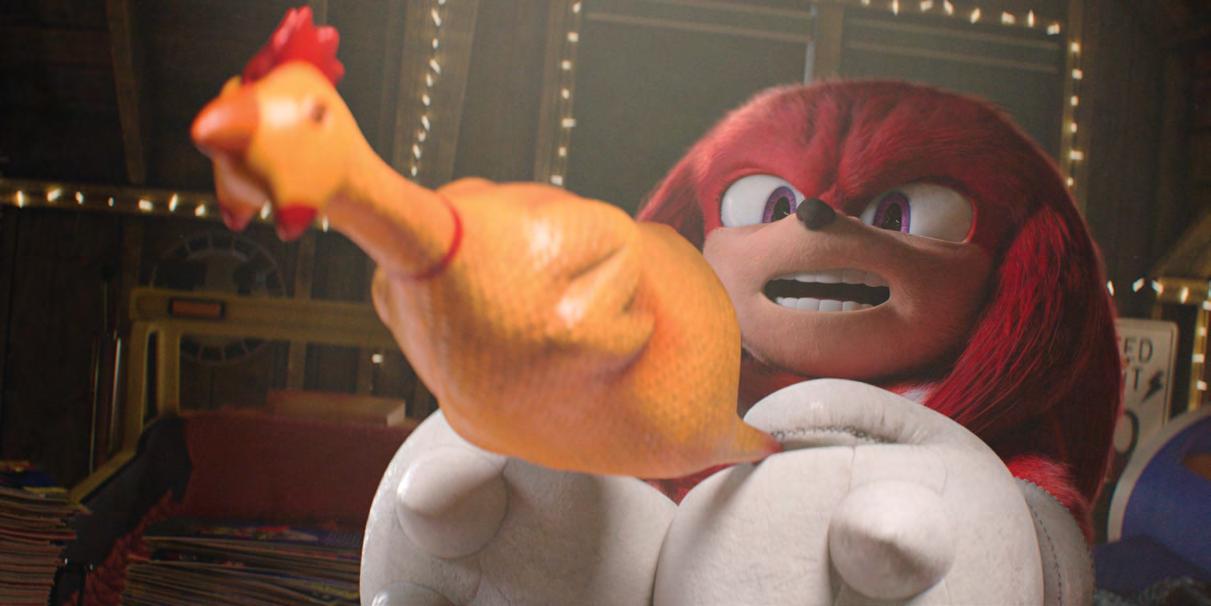
was a special year for Sega. The company solved the problem of their flagship game, Sonic the Hedgehog 3, far exceeding a reasonable file size by splitting it into two games, giving birth to Sonic 3 and Sonic & Knuckles (later known as one game — Sonic 3 & Knuckles). Thirty years later Paramount is helping the historic game studio repeat the trick.
Ahead of the December release of the third installment in the Sonic the Hedgehog movie franchise, Paramount+ will be home to Knuckles, a six-episode spinoff series focusing on Idris Elba’s deadpan echidna last seen in 2022’s Sonic the Hedgehog 2. His villain-to-hero arc continues as he is tasked with training cowardly town sheriff Wade Whipple (Adam Pally) to be a fearsome warrior.
This nod to video game history was an intentional move by the executive producing team behind Knuckles: Toby Ascher, Jeff Fowler and Neal Moritz. The storylines of the games guided the team on how to map out their franchise. “We did Sonic 2 and brought in Tails and Knuckles, and then the next step is Sonic 3 with the Knuckles
expansion pack,” Ascher tells Animation Magazine.
Besides showing reverence for Sega’s past, Ascher, Fowler and Moritz were also keen to take advantage of the path laid by Marvel to build out the wider universe of their intellectual property and attempt longer-form storytelling. “One of the things that we really like that Marvel does is looking at Sonic as not just a video game movie but a world where we can tell stories in a lot of different genres,” Ascher explains. “For us, Sonic 1 was our take on a buddy comedy like Midnight Run or Dumb and Dumber Sonic 2 was our version of an Indiana Jones movie, a globe-trotting quest to find the Master Emerald. Now Knuckles is a throwback to ’90s comedies that I grew up loving. We talked about Happy Gilmore, The Big Lebowski and Kingpin while making it.” The limited series creates room for smaller, lighter stories in between their versions of Avengers movies.
Great Expectations
The Sonic films operate on such a scale that made translating their world to the limits of TV a challenge. Ascher had high expectations of what
could be achieved with the series. “In the ’90s, there were these TV rip-off versions of big movies. I remember watching Men in Black: The Series, and we knew that if it became that, it could damage what we built with the Sonic film brand,” Ascher says. For Knuckles to feel congruent with upcoming installments the show also had to push beyond what previous movies had achieved. “Knuckles has 1600 animation shots, which is 300 more than Sonic 1, but it is exactly the same quality and literally the same character assets as those in Sonic 3,” says Ascher.
The entire animation pipeline was shifted to accommodate this ambition, particularly when it came to the team’s relationships with their vendors. “On the last couple of Sonic movies we’ve worked with one vendor, which led to some problems — one being that if they fall behind you’re stuck with them,” says Ascher. “We knew we needed to do a large amount of animation in a short amount of time, so one of the big changes we made is that while usually the vendor controls the assets that they rig, we made an investment in the Sonic assets and we
www.animationmagazine.net 26 may 24 TV/STREAMING
1994
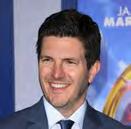
'You want the character animation to have that sharper timing and really dialed-in expressions and poses.'
— Director Jeff Fowler
built them in-house. We then went to six different vendors: ILM, RSP, Fin, Outpost, Untold and an in-house team.”
“They were willing to work with us on a system where we control the rig asset in-house and allowed that to be worked over by six different vendors. That allowed us to create what we called ‘speedboat vendors,’ where they could each take a sequence or two and it would look exactly the same as what we had, allowing us to [do] quality control internally. The other thing it allowed us to do is build a pretty hefty in-house team of animators who just worked for Sonic 3 and Knuckles. We could do our own animation shots on it, so we could keep costs down and move faster.”
Jeff Fowler, who directed the first episode of Knuckles, was keen to stress the collaboration he had with each studio. “The technical side wasn’t as important as the creative engagement,” he points out. “You have six different vendors, but you want all the animation to look like it’s coming from one place and so a lot of that just comes down to communication.”
As a director, Fowler looked to enhance the onset experience for both the actors and animators. “One thing we did, which we haven’t done in the past, is have an on-set puppeteer with a Knuckles
puppet so the actor has something to respond to,” explains Fowler. “We can then do blocking with the puppeteer. You don’t want your CG characters to be standing there dead in the water in one spot the whole time; you want them to move around and use the space.” This provided freedom from the restrictions enforced by the approach taken on Sonic 1 and Sonic 2 where actors were tasked with playing off a tennis ball on a stick.
Elsewhere in the industry motion capture is used to negate the tennis ball problem, but the idea of using it for the Sonic franchise was dismissed early on due to the proportions of the characters’ bodies being much more top-heavy than that of a human. CG animation enhances the exaggerated designs of the Sonic characters and has them slot naturally into live action.
“What we do with these films ends up more like a feature animation where you’re looking for a slightly more stylized performance,” says Fowler. “You want the comedic timing. What Ben (Schwartz, voice of Sonic), Colleen (O’Shaughnessey, voice of Tails) and Idris give us is an animation in their performance. You want the character animation to have that sharper timing and really dialed-in expressions and poses. Even though we’re putting them into a live-action
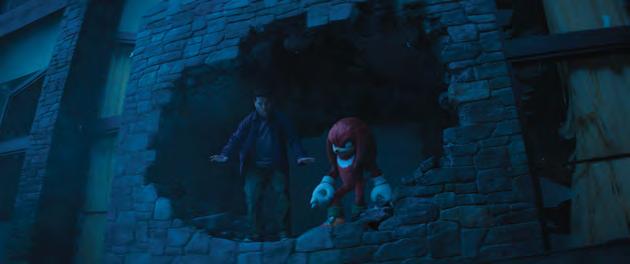
world with human actors, I always try to nudge things a little closer to a more stylized take on it.”
Storyboards to the Rescue
Also similar to the feature animation process is Knuckles’ reliance on storyboards. In a live-action hybrid show, storyboards have use beyond knowing where to put the camera. Fowler says, “You could be filming a plate. It’s supposed to be a scene of Sonic talking to Knuckles, but if there’s no human actor there it’s like you’re shooting nothing.” Through storyboards, the crew is able to better visualize what the final product will be.
The objective of Ascher, Fowler and Moritz boils down to doing right by Sonic fans of all persuasions. Ascher says, “This year, fans are going to get an extra three-hour movie in addition to Sonic 3, just like the expansion pack,” serving new fans while nodding to those who have been around for 30 or more years. Looking forward to their showstopping feature this December, Ascher adds, “We have all played rigorous amounts of Sonic Adventure and are focused on telling our biggest, most exciting story. We can’t wait for you guys to see it.”
Knuckles is currently streaming on Paramount+.

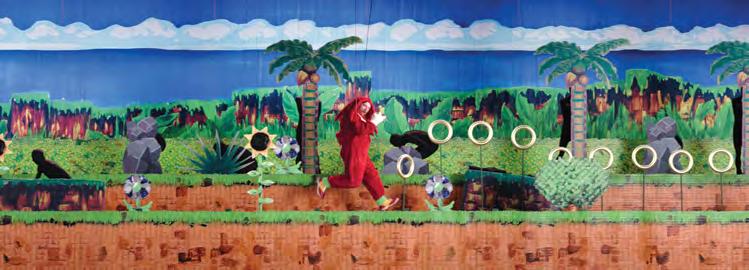
may 24 27 www.animationmagazine.net TV/STREAMING
◆
ON THE ROAD AGAIN:
Knuckles and Wade Whipple (Idris Alba and Adam Pally) continue their zany adventures in the sixepisode miniseries that premiered on Paramount+ in April.
The Return of the Nublar Six
The kids are older and the stakes are higher in the hot new DreamWorks series Jurassic World: Chaos Theory.
- By Ramin Zahed -
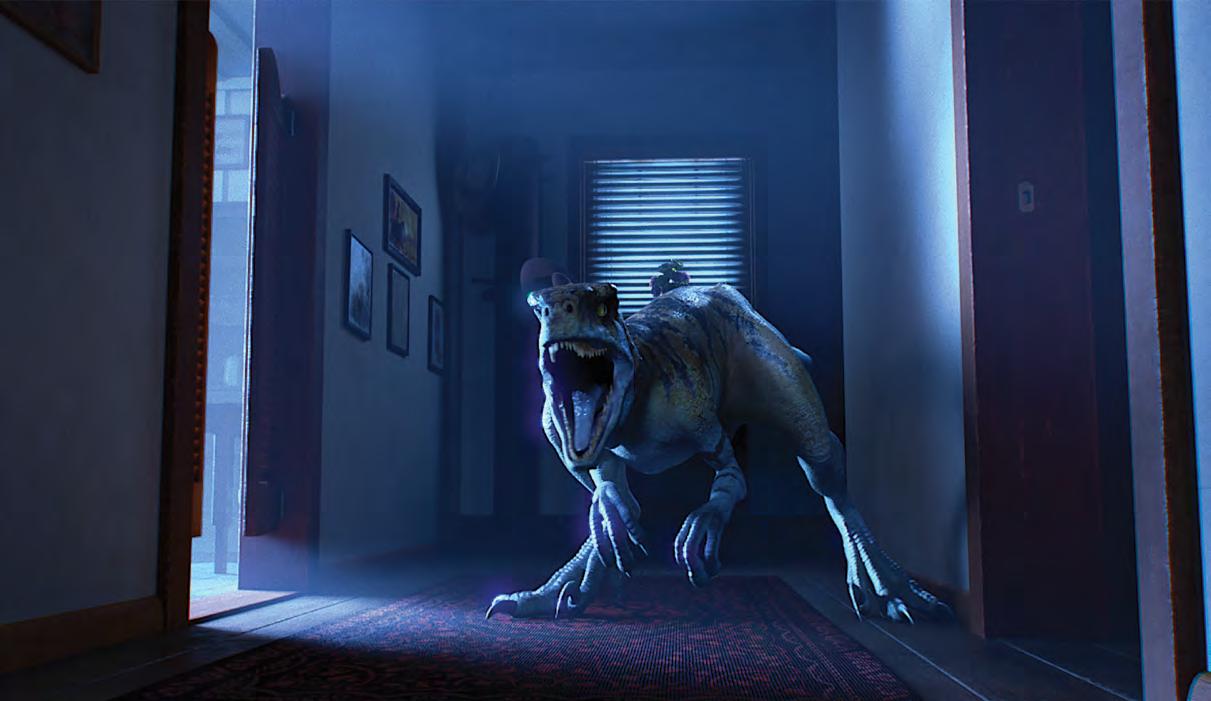
It just wouldn’t feel like summer without another exciting new chapter in the ever-expanding Jurassic World franchise, and this year we have a hot new animated series titled Chaos Theory thanks to the folks at DreamWorks Animation and Netflix. The great-looking new series is set six years after the events of the previous show, Camp Cretaceous, and finds the members of “The Nublar Six” team struggling to find their footing off the islands and navigate a world filled with dinosaurs and those who want to hurt them.
“With the success of Jurassic World: Camp Cretaceous, there was a lot of interest in a follow-up series from the folks at DreamWorks, Universal and Netflix,” says showrunner and exec producer Scott Kreamer. “My initial reaction was that we had already told the tale of the Nublar Six in a way that made us all very
proud. This was before Jurassic World: Dominion had been completed, and my fellow executive producer Aaron Hammersley and I got on a big Zoom call with the folks from Universal and DreamWorks.”
The Plot Thickens
Kreamer, a five-time Emmy-nominated animation veteran whose many credits include Kung Fu Panda: Legends of Awesomeness, Pinky Malinky and The Penguins of Madagascar series, says they were walked through the live action. “It was a new chapter in the story that I just couldn’t get out of my head,” he adds. “These kids had become such a big part of our lives that it was tougher to let them go than we had realized. Before long, Aaron, story editor Bethany Armstrong Johnson and I started brainstorming, and the show as a whole began to crystallize into what it would become.”
One of the big differences from Camp Cretaceous is that the kids are all much older in this new adventure. “Our characters are six years older now and at that uncertain age where one is trying to figure out who they are and where they fit in the world,” explains Kreamer. “They are also dealing with the lasting trauma of their near-daily fight for survival amongst the dinosaurs in Jurassic World: Camp Cretaceous, and now the dinosaurs seem to have followed them back to the mainland. Couple this with a tragedy befalling one of their own during the time between the two series and our heroes have an awful lot on their plates.”
Tonally, the show also has a different vibe. As Kreamer points out, “The first show was more of an action-adventure ‘kids working together to survive an island full of dinosaurs,’ while this one is a full-on thriller of ‘young adults trying to figure out who’s trying to use
www.animationmagazine.net 28 may 24 TV/STREAMING

'It was a new chapter in the story that I just couldn’t get out of my head … These kids had become such a big part of our lives that it was tougher to let them go than we had realized.'
— Showrunner and executive producer Scott Kreamer
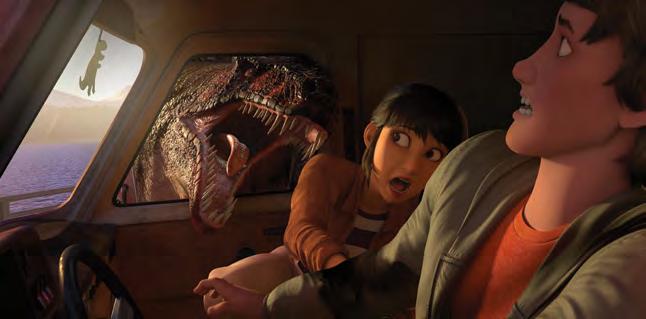
dinosaurs to kill them, and why, before it’s too late.’ Yes, Jurassic World: Chaos Theory still has all the awe, wonder, camaraderie and humor that Jurassic World: Camp Cretaceous had, but now seen through a slightly different lens.”
Kreamer says he loves the fact that he and his team were able to continue the hero’s journeys of the original characters from the first show at a different time in their lives. “This is a rare opportunity that isn’t lost on us,” says the showrunner. “Bethany and our amazing writing staff met the challenge head-on as they stayed true to the characters set forth in Camp Cretaceous and then took them to places they hadn’t been before.”
He is also quick to praise the show’s superb lighting and cinematography. “We were able to take our time and let scenes breathe, to establish a tense, uneasy mood and tell stories of a darker tone than usually done in what is traditionally known as children’s TV animation,” says Kreamer. “I love that the team took some big creative swings. But most of all I love this crew. Across every single department — production, writers, artists, editors — each and every one of them put such time, care, thought and effort into everything they did to make something really special. We really wanted to do something new, and the team as a whole answered the call. This was an entirely group effort. I couldn’t be more grateful for, or prouder to be associated with, such an outstanding collection of people.”
The animation was produced by the team at DreamWorks TV Animation here in Los An-

geles and frequent collaborator CGCG in Taipei, Taiwan, who also worked on such shows as Dragons: The Nine Realms, Abominable and the Invisible City and Curses! According to the producers, about 250 people worked on the show overall. From start to finish each episode takes about 17 months to make. Shot production ends up being around six months, while just animating a single episode takes about 12 weeks.
Visually, the team had a wildly eclectic sources of inspiration, many of which were conspiracy thrillers from the 1970s, such as The Parallax View, Three Days of the Condor and All the President’s Men. “We wanted to evoke a similar uneasy vibe, putting the main characters at a disadvantage as they try to figure out what’s coming next before it’s too late,” says Kreamer. “As far as the look and feel of the show, we wanted to start with what we did in Camp Cretaceous and evolve it into something new, something darker, more sophisticated.”
Kreamer speaks fondly of the work done by art director JP Balmet and his team; the cinematic and moody approach to storyboarding and pacing by executive producer Aaron Hammersley, supervising producer Zesung Kang and the directors, board artists and editors; and the evocative lighting and imagery created by lighting/comp supervisor Eric Hawkins and his lighting team. He also commends to the more realistic, subtler animation overseen by CG supervising producer Dan Godinez, animation director Ryan Donoghue and their inhouse team, as well as the animators in Tai-
wan at CGCG. He adds, “We also had the ambitious work that FX lead Emad Khalili and his team plussed every episode. Combine that with our stellar voice cast led by voice director Sirena Irwin, Leo Birenberg’s spectacular new score, plus the soundscape created by Rob McIntyre and D.J. Lynch at Sound Rebels and I think the team as a whole achieved something pretty special.”
Dino-Mite Diversions
And why does Kreamer think these giant dinosaurs have won such a huge place in the hearts of young animation fans for so many years? “You know they are the closest real thing we have to mythical creatures, and in the world of the franchise we get to imagine what it would be really like to live alongside them,” he says.
When asked about the overall state of the animation business, Kreamer is brutally honest. “It’s as rough out there as I have ever seen it in the more than 30 years I have been in the industry,” he admits. “It is getting harder and harder for creators to break through with new ideas that aren’t associated with an established IP. We are so lucky to have this giant franchise which allows us to tell what is at its heart a personal, character story. I am hopeful that there is a world where creators focus on making ‘art,’ as opposed to ‘content,’ but we will have to see how things shake out.” ◆
Jurassic World: Chaos Theory premieres on Netflix on May 25.
may 24 29 www.animationmagazine.net TV/STREAMING
DINOSAUR DESTRUCTION: Paul-Mikél Williams, Sean Giambrone and Raini Rodriguez are part of the voice cast for Jurassic World: Chaos Theory , the sequel to DreamWorks’ Camp Cretaceous series.
¡Ella Está de Vuelta!
Dora and her friends are featured in a splashy new CG-animated series on Paramount+.
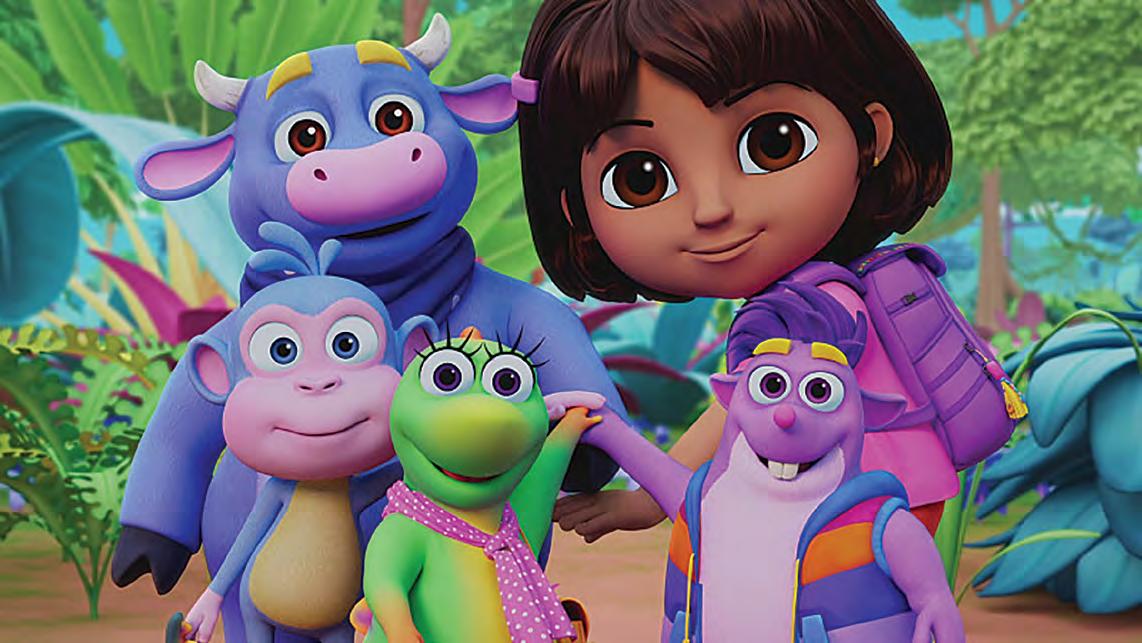
It’s been 24 years since Nickelodeon’s clever, bilingual heroine Dora the Explorer and her best monkey-pal Boots changed the preschool animation landscape forever. Created by Chris Gifford, Valerie Walsh Valdes and Eric Weiner, the hugely influential show proved to be quite a cultural phenomenon, leading to spinoffs, a merchandising empire and even an aged-up live-action movie in 2019.
This spring a new CG-animated version of the franchise titled Dora introduces a whole new generation to the charming heroine. Dora (voiced by Diana Zermeño) and Boots (Asher Colton Spence) continue their epic adventures in a magical rainforest. Guided by trustworthy Map (Anairis Quiñones), Dora and her friends must work together to overcome many obstacles while being challenged by the sneakiest fox, Swiper (Marc Weiner). Kathleen Herles, the original voice of Dora the Explorer, returns to the new series as Mami, and Mike Smith Rivera joins the cast as Papi.
The show’s executive producer is none other than longtime Nickelodeon veteran Rich Magallanes. “Dora has always been a part of my upbringing at Nickelodeon,” he tells Animation Magazine. “I came on board just after the start of Season 1 production and immediately recognized that there were so many great reasons to get involved. In addition, I felt that now is the time to bring Dora back in new adventures and couldn’t wait to join the team.”
Lasting Impressions
Magallanes points out that Dora is a legacy property — a worldwide brand that unites kids and families alike. “I’ve worked on several series based on iconic franchises in the past and always find them a challenge, but when it’s something like Dora it’s especially exciting because we’re infusing fun, culture, language and adventure.”
Claudia Spinelli, Nickelodeon’s VP of franchise animation development, says, “Dora was a groundbreaking character as she was a bilingual little girl who went on these high-
stakes adventures, but she was also very caring and inclusive of all her friends. There are lots of shows that offer interactivity with the viewers as Dora does, but with her you fall in love with her first and then you play along with her in her adventures.”
Although the spirit of the show is the same as the original Dora the Explorer, there are certain differences that immediately stand out. “We are bringing Dora into today’s world,” says Magallanes. “First of all, the new Dora is in CG animation — it’s a whole new look with brilliant colors and new locations. She still has all the confidence and relatability she’s always had, but our stories are now more character-driven, our adventures are more exciting, the comedy is bolder, our pacing is slightly quicker, and yet we have tons of heart. Hitting the reset button is all about keeping Dora’s integrity, interaction and language-learning skills with an elevated boost!”
Of course, the fact that the 2024 version of Dora and her world are CG-animated has its
www.animationmagazine.net 30 may 24 TV/STREAMING

'There are so many takeaways from cultural representation, to learning a new language, doing the right thing and trust and love in family and friends.'
— Exec producer Rich Magallanes


own share of challenges. “CG is a whole other level than traditional 2D,” says the exec producer. “We need to be aware of sets, characters and all the assets we build for every episode. It’s challenging, but it also creates a certain level of creativity in that we need to think differently in how we execute our stories.”
The series animation is produced by Pipeline Studios. As Luis Lopez, Pipeline’s CEO tells us, “Our animation and production team consist of top-tier talent from our global studios, with Dora being crafted at Pipeline Studios in Canada, Chile, Colombia and Spain. We bring a truly diverse and multicultural blend of worldclass expertise, breathing life into the beloved world of Dora for a fresh generation.”
“Harnessing tools like Advanced Skeleton, Maya, Houdini, Anim Picker and Arnold, our artists meticulously sculpt each scene with finesse and creativity,” adds Lopez. “Coupled with the expertise of our dedicated developers building custom tools tailored for this project, we ensure an unparalleled standard of excellence and innovation in every frame.”
Magallanes says he has been blown away
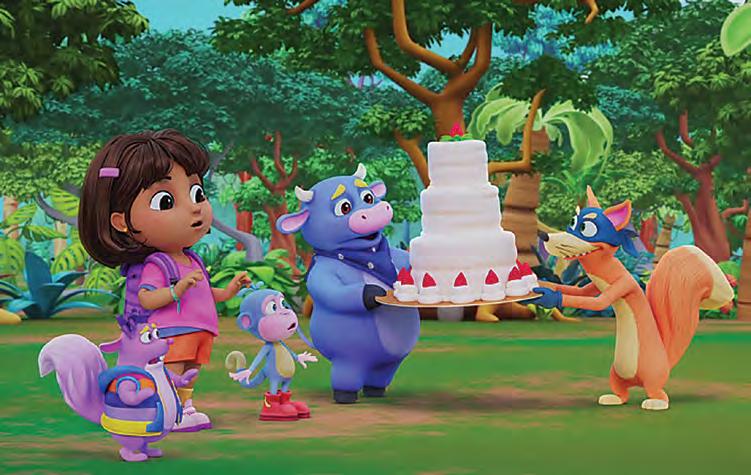
by the hugely enthusiastic responses of early test audiences of the show. “Kids would literally stare in awe at the show,” he recalls. “They smiled, danced and laughed throughout our sessions. Watching how engaged they were and seeing their level of happiness and interest was pure joy. To top it off, the parents were also thoroughly enjoying the show. They were thrilled and loving the fact Dora was back and with purpose, substance and meaning.”
So why does Magallanes think Dora is such a big hit with kids all over the world? “She is truly a hero with heart,” he says. “She cares and never forgets the audience is there on all her adventures. She’s confident but is also vulnerable — she may not have all the answers, but she’s willing to figure it out, and she always invites the viewer on that journey.”
More Catchy Songs!
Magallanes says it’s very difficult for him to pick his favorite episode of the first season of this new take on Dora. “Every week I have a new answer to that question,” he admits. “Seriously, it’s too hard to nail down one episode
as the hits just keep coming. We have some really incredible songs and moments that I can’t reveal just yet, but the show literally gets stuck in your head, and you just can’t help but sing and/or think about some of the situations in the stories days later.”
Now that the show is ready to find its way to screens and hearts around the world, Magallanes says he has high hopes for this new take on Dora. “There are so many takeaways from cultural representation, to learning a new language, doing the right thing and trust and love in family and friends,” he says. “Bottom line, I hope the audience walks away fully entertained, feeling great and empowered with a warm heart to spread goodness in the world!”
As Dora might say, “Por supuesto que lo harán (Of course they will!)” ◆
Produced by Nickelodeon Animation, 26 CG-animated 11-minute episodes of Dora air exclusively on Paramount+ in the U.S., Canada, the U.K. and Australia; 20 episodes are available to stream worldwide (outside France and Japan). The series will also air on Nick Jr. internationally.
may 24 31 www.animationmagazine.net TV/STREAMING
HOLA, SHE’S BACK! The new CG-animated Dora on Paramount+ offers 26 action-packed episodes featuring the bilingual heroine and Boots, Backpack, Map and the rest of the crew.
Hearts and Smiles
Acclaimed Arthur creator Marc Brown introduces young viewers to Hop and his friends.
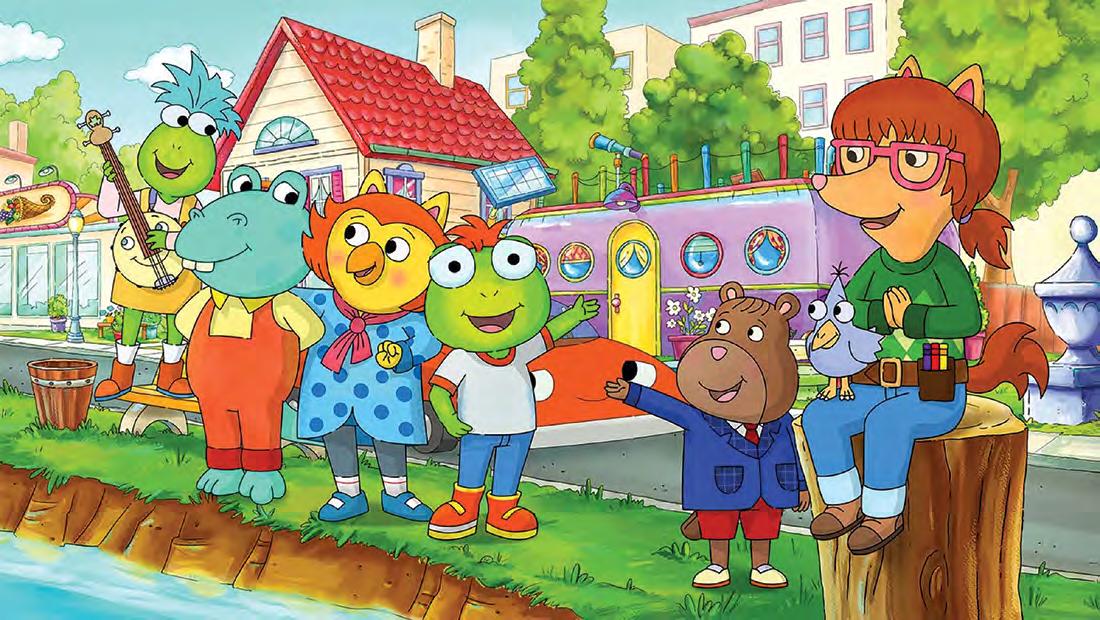
Those who fell in love with the wonderful and hugely influential children’s show Arthur, which ran on PBS for 25 seasons (19962022), are thrilled to know that its creator Marc Brown has another big project coming up. On April 4, Brown’s new series Hop, a new venture about a group of eclectic best friends which spotlights kindness, acceptance and working together, premieres on Max. Co-created by Brown and Arthur alums Peter K. Hirsch and Tolon Brown, the show centers on Hop, a high-energy, empathetic frog with one leg shorter than the others.
One of the unique aspects of the show is that its entire ensemble voice cast cope with some type of disability, allowing young viewers to relate and better understand the various challenges faced by many around the world.
We were fortunate to have a lovely chat with the fantastic Marc Brown about his new labor of love. Here is what the three-time Emmy-winning author, illustrator and show creator told us:
Animag: Well, first of all, congratulations on the debut of your charming new show, Hop, which premieres on Max in April. Can you share with us how and when you started thinking about the new project and its characters?
Marc Brown: Of course. I guess it was about three years ago that I was at my drawing table, and I happened to draw this little doodle of a frog. I realized that one leg was a little shorter than the other. I guess I had in the back of my mind that Arthur was finishing up after 25. We had done so many stories and I always wanted to work for a younger audience. I was lucky enough to have Fred Rogers as a good friend, and I was really influenced a lot by what he did for kids and how well he did it. So, the hope was to add to what Fred had done for kids, and also including humor in the mix as well. As I was talking to my wife about this interview this morning, she told me, “Don’t forget to mention that the show is about two things: humor and heart.”
Perfect, now how would you say the show is different from our favorite Aardvark series?
I think one of the things that makes it a little special is that some of the main characters have disabilities. You know with Arthur, we did introduce characters with disabilities yes but they never had a meaningful, ongoing relationship with the main characters and it felt a little gratuitous in a way for me. The letters I get from kids when we do include characters with disabilities really encouraged me to make this a foundational part of the show. As I explained, Hop has one leg shorter than the other and that doesn’t get in his way. What I like about the way this show handles disabilities is it never defines who our characters are or what they can accomplish. We focus on friendship and the power of working together to get things done
Arthur was about telling kids the truth. I believe that kids look to us in the media for truth, and I don’t think there’s enough of it out there right now.
Can you talk about the visual style of the show?
I guess I can’t help myself, but I draw the way
www.animationmagazine.net 32 may 24 TV/STREAMING
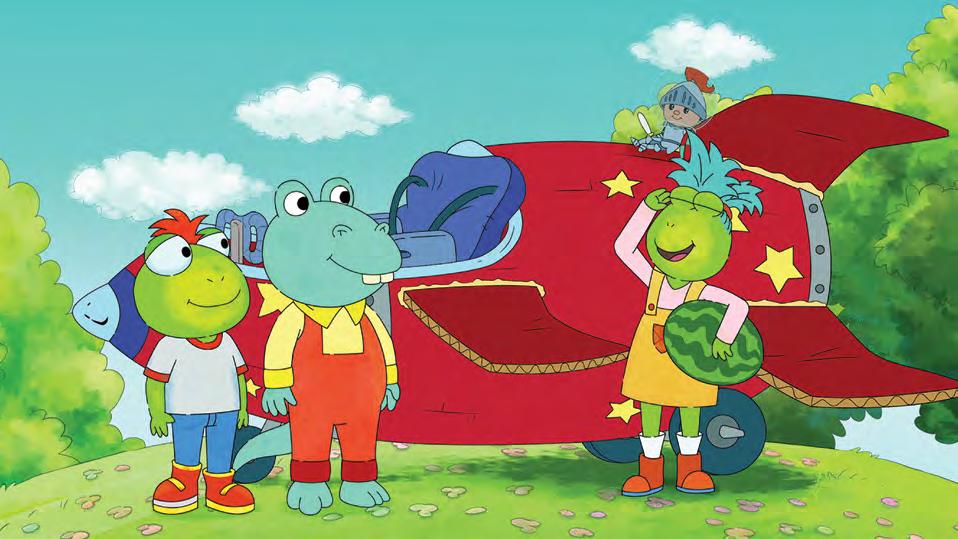
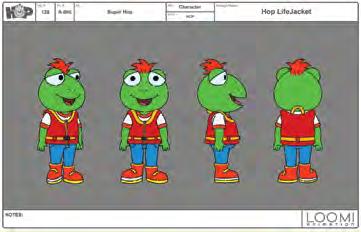

I did for Arthur, and so the characters in Hop look similar to the characters in Arthur. I just want to say something about how Arthur made me love being a part of a team. When I first met with the people at Cinar [the now-defunct Canadian company which produced Arthur] and we began working on Arthur, I had a really hard time sharing these characters that had become so close to me. But working together as a team I saw how much more we could do with these. I feel really lucky that we have Peter Hirsch who was our head writer for Arthur almost all the way through and my son Tolon who was a producer for 20-some years working on Hop. They bring all these people together that care about kids in the most important ways. We’re all having a good time
EMPATHIC ANIMALS: Arthur creator Marc Brown brings his expertise in creating lovable characters for young viewers to Hop , the new animated show about a dynamic frog and his friends.

working on this series it doesn’t feel like work!
How long did it take to wrap the first season (26 episodes), which is produced by Epic Story Media and Loomi Animation [using Toon Boom’s Storyboard Pro and Harmony and Adobe’s Photoshop for design, layout and colors]?
I guess it took about three years, and yes, we’re done with the first season now polishing some episodes for the season. I’m so lucky to be working with the folks at Epic Story as they let me have access to all the paints in the paintbox. You know, with Arthur I didn’t have that kind of access, for example, I wasn’t really involved with the sound mixing and all that. But with Hop, I have really discovered the power of what that can do for the show. Music
also plays such an important part of our show. Another big thing is that I’ll be there in a voice record, and I’ll see that an actor is struggling with a certain line , and I can just rewrite that line. Those little things make such a big difference. I’m really enjoying being more a part of the entire creative process.
Looking back, are there any specific episodes that stand out for you?
Well I always come to these episodes as a six year old and, and I do like some of the spooky stories. We introduced this little troll named Helga, and our character Benny who is afraid of just about everything around him encounters her. The episode is really about making judgments about people before you get to
may 24 33 www.animationmagazine.net TV/STREAMING
Marc Brown
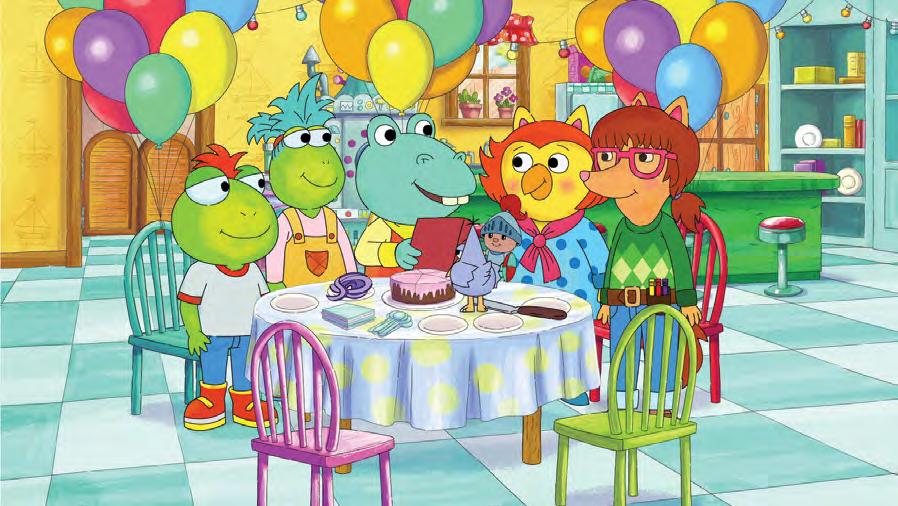

know them, and so after the two meet, they find out how much they have in common and they become friends: It’s just one of the messages that’s important for kids to think about. Working with one of our voice actors (Charlotte Walker) who is neuro divergent proved to be quite a memorable experience. Initially, I was a little nervous about the authentic casting of the character (Filipa, the squirrel), but you know what? Charlotte absolutely nailed everything and brought such heart and enthusiasm to the character. You always want to make sure the actors are the right fit with the characters they play, and once you get to know them as other stories evolve, it really helps to have that foundation of who that person is to build new stories on.
Speaking of important messages, Arthur was on always on the forefront of fearlessly including important themes and storylines, regardless of the conservative backlash it faced. You know, when we did the “Mr. Ratburn and the Special Someone Episode” in 2019 [in which Arthur’s teacher gets married to his same-sex partner] , we got so many texts and letters from kids and adults who said, “I wish there was something like that on television when I was growing up.” So, yes, we were lucky
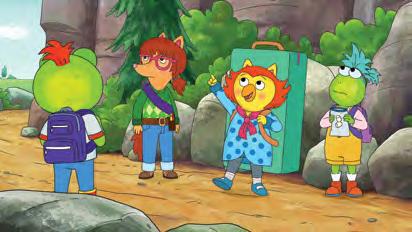
to have done that. Another thing that is really important is about Hop following in the footsteps of Arthur: We were able to gain so much trust from parents and that’s something that I really value. I feel like we can be an ally with parents with the show because parenting is really the most difficult job that anyone can ever! It’s a lot like being a trapeze artist: You have to know when to let go, but there’s a long time that you have with children before that happens. I like to think that with stories in the picture books and the TV shows we offer families opportunities to share your values: They are great conversation starters.
What do you think about the wild world of children’s animation in 2024?
I wish that I watched more of it but I don’t if you have a life yeah you’re really creating I did it I ripped the Band-Aid off you know I’m a little intrigued about 3D animation yes and I hope I live long enough to maybe try a entering that world. I’ve had some conversations with animators about that and I see great potential there, so I think that would be a fun thing to try.
What do you hope audiences will take away from Hop and his friends?
I hope that they will see the humor and the heart in the show. We’ve put a lot of love and effort into it, and I hope that it will inspire families will find the series helpful to have those conversations about what they’re watching together.
Do you have any good advice for young people who want to write or draw books or create animation for children?
I get that question a lot when I visit schools and talk to kids. I think you have to practice, just like playing basketball or playing the piano. Fill up your sketchbooks, and make sure you write or draw something in it every day. I think that training your ear to hear dialogue around you is really important. Truman Capote used sit in the park all day and listen to the conversations around him, and then he’d go home and try and recreate as much of them as he could yes. It’s all about practicing and not giving up. If you want to do something that you love, you have to be persistent! ◆
Six half-hour episodes of Hop premiered on Max in April. A total of 26 episodes are set to roll out on the streamer this year. The show is produced by Epic Media in Toronto and animated by Loomi Animation in Quebec City.
www.animationmagazine.net 34 may 24 TV/STREAMING
LEAP OF FAITH: Hop is set in the aspirational community of Fair Village and centers on an empathetic frog with one leg shorter than the other, and his quirky friends.
The Existential Angst of Puppets
Director Nina Gantz looks back at the making of her award-winning short, Wander to Wonder.
- By Ramin Zahed -
Three bewildered puppets from a children’s TV show try to figure out how to carry on after the death of their creator in Nina Gantz’s poignant and truly original short, Wander to Wonder. The talented Dutch director, who recently won the top Jury Prize at the SXSW festival, answered a few of our questions about her lovely work.
“The inspiration for the short came from a lot of different places,” Gantz notes. “Visually, I was always fascinated by old films that combined live-action and stop-motion. I feel that the combination really stands the test of time. I love that it doesn’t try to hide the technique but is still believable when put together in the same world.”
She says she wanted to create a world with multiple complex characters to allow her to explore dialogue for the first time. “The idea that it’s all set in an old TV show studio originated between me and [co-writer] Simon Cartwright. We had heard about scandals and abuse linked with some of the most famous British kids TV shows, and we became fascinated by the juxtaposition of the sweet innocence of these shows and the murkiness behind the scenes.
“A few years into the project, due to budget changes, Covid, and Simon moving over to another project, I rewrote the script completely with the help of Daan Bakker,” she adds. “The story became more focused on the journey of the little humans and how they all deal with grief in a very different way. But the contrast between the innocent and sinister world is still there.”
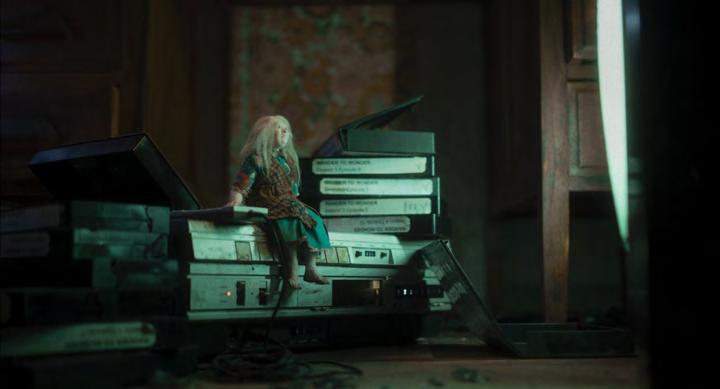
Evolution of the Tale
The beginnings of the short go back to 2016 when Ganz and Cartright (director of Manoman) were on their way to Sundance to screen their graduation films. It took about eight years to finance the new project. The final project is a collaboration between Pedri Animation in the Netherlands (fabrication of the silicone puppets), Blink in the U.K. (3D modeling and facial animation), Mon Beau Studio in France (life-size sets), and Rosie Tonkin in the U.K. (small sets and props). The team used DragonFrame for the shoot.
The director mentions that her own personal experiences also played in important part on the short’s creative evolution. “During the last re-write of the script, I experienced a bereavement, which made me focus even more on how the characters dealt with such a seismic event. Around me, I saw how people cope very differently with their grief and that’s something you see in the film. Mary clings on to the past, almost acting like nothing has changed, Fumbleton feels like he finally can be free and let his ambition as a serious Shakespeare artist come out and Billybud continues to juggle for the fans.”
LEADING THE PUPPETS:
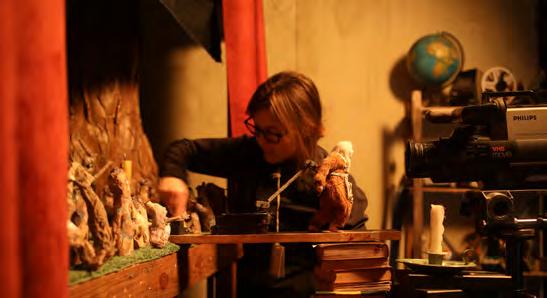
Director Nina Gantz used some of her own experiences to bring Wander to Wonder to stop motion life.
Gantz says she
loves working in stop-motion animation because of the solitary, almost meditative work during the animatic stage, as well as the more collaborative steps later. “Also, the tactility that comes with stop-motion is wonderful. You can really use the material to your advantage in a story. For instance, with my previous short, Edmond, I think if you told that story in real flesh and blood it would have felt very different than making splashes of blood out of wool. Because of the softness of the wool, you can soften the emotion in some way. In Wander to Wonder we tell a story of grief but by showing this through the eyes of three tiny human puppets I think it brings some lightness to the story.”
When asked for some helpful advice for new stop-motion directors, she says, “I would advise you to get work experience at any production company you like the work of. It gives you the chance to look at the different working methods of directors and do little jobs so people get to know you. I also would advise doing a master’s degree at a film school. I studied for two years at The National Film and Television School and it was a life-changing experience for me. I learned a lot from the teachers and also from all the students around me. I still work with some of the people I met there. Hell, I even married one of them — Terence Dunn, the music composer for both Edmond and Wander to Wonder. ◆
For more information, visit ninagantz.com.
may 24 35 www.animationmagazine.net
SHORTS
Now You See Them
How VFX supervisor Chris Lawrence, animation supervisor Arslan Elver and the team at Framestore brought IF’s magical creatures to life.
- By Trevor Hogg -

Afew years ago, in an effort to bring a sense of hope to his children who were experiencing depression during the pandemic, John Krasinski (A Quiet Place) wrote a script about a young girl trying to reunite forgotten imaginary friends with their children. Eventually, the talented multi-hyphenate ended up directing the movie, which is titled IF and stars Ryan Reynolds and Cailey Fleming, as well as Steve Carell, Phoebe Waller-Bridge, Louis Gossett Jr. and Christopher Meloni as the voices of the imaginary characters. To make the invisible visible, Krasinski turned to VFX supervisor Chris Lawrence (Christopher Robin) and effects house Framestore to deliver around 800 shots and a cast of approximately 42 different CG characters.
“We’re having so much fun with this because it calls on all kinds of different movies that I loved when I was growing up, like E.T. the Extra-Terrestrial and Jim Henson’s films through to Who Framed Roger Rabbit” says Lawrence. “And we’re doing that with a completely original idea
with a director who is as insanely enthusiastic as John Krasinski, who loves our craft and every little detail of what we do! It’s so nice to be working with that kind of talent!”
Ruled by Imagination
Lawrence adds, “There is an element of imagination and magical realism to this story. As a film tool, the audience believes that the characters are there. The magic feels more elevating. We filmed with a lot of puppets and tried to allow John to stage things in a way that respected the truth of the space and the performances [that] were ultimately going to be there.”

Dealing with the hybrid approach of live action and animation was a welcome challenge. The film’s animation supervisor for Framestore, Arslan Elver, says animating a character and creating them from scratch in a live-action movie was quite rewarding. He adds, “On top of that we came up with a couple of clever things. For the character Blue, who is quite big, we wanted to keep that spatial truth and size. There was a backpack for the standin guy with an eyeline but also a little hula hoop around him, so when he moves around we know roughly how big Blue is and where he’s going to touch stuff. That was all helping John with framing and to place his character exactly as he wanted but also in a believable way.”
Steve Carell’s energy was a huge help when the team was working on ADR. “It’s fun to animate to him,” notes Elver. “For this project, particularly, we had a new facial system at Framestore. Normally, we used this blend-shape-heavy system where everything is based on FACS (Face Action Coding System) which is truly moving in the same way
www.animationmagazine.net 36 may 24 VFX & TECH

‘We’re having so much fun with this because it calls on all kinds of different movies that I loved when I was growing up … and we’re doing that with a completely original idea with a director who is as insanely enthusiastic as John Krasinski.’
— VFX supervisor Chris Lawrence
that a muscle would move. But in this system we were a lot closer to a feature animation rig where things are freer for the mouth and eyes of the character so that artists can truly shape the emotional aspect of it or the mouth shapes into the finest details that they were not able to do before.”
The film’s cinematographer was none other than Janusz Kamiński (The Fabelmans), who has a vivid photographic style. “Janusz was so brave with his lighting choices that the whole world of the movie is in this heightened reality anyway,” notes Lawrence. “That was important. We were obviously shooting quickly, because you always shoot quickly and try to not waste time, but we were given the space by the ADs to do takes with puppeteers in and, honestly, quite often we would leave them in.”
they’re desperate to connect back. But at the same time you don’t want their performance to be sad,” he notes. “You can fall into this world that is only sad; you don’t want that. You want them active, still trying to figure it out and find happiness, because otherwise
then he’s into that basket and you know what? You believe in it, because when Blue comes out there is a big squish going on around his belly; he’s in that space.”
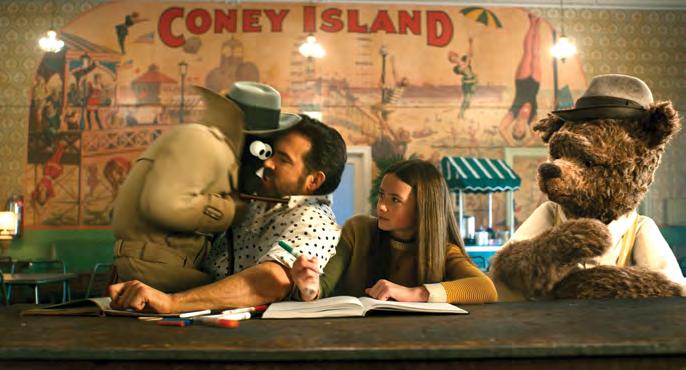
Every environment in the movie was lidar scanned. “Often there is a whole load of reconstruction that’s going on in the background,” reveals Lawrence. “In the case of the Tina Turner dance number that reconstruction was insanely complicated and was a heavy CGI build of the whole theater. However, when you watch it, I couldn’t tell you which bits are plates and real because they dealt with it so well.”
As expected, the project showcased some amazing on-set ingenuity. “With these smartphones you can now scan a room or set,” says Lawrence. “Sometimes Arslan would literally walk on as they were about to shoot, scan the set, upload it to his laptop connecting with the real rig for the character, and he would start animating a shot. You could line up, match the dailies take [on Camera Assist] and show John, ‘This is what it’s going to look like.’”
Elver points out that achieving the proper tone for the film’s imaginary characters was quite important. “You imagine something quite interesting where these characters and their humans aren’t there anymore and
your audience will not connect with them.” Normally with effects-heavy creatures, the simulation needs to be physically correct. “In this case a lot of our character are so handcrafted and artistically driven in terms of posing and silhouettes,” says Elver. “You have this character [Cosmo] with a trenchcoat, like a spy kind of thing with a fedora hat, and when he is on top of Ryan or questioning him you want that silhouette to be really beautiful. If you run a normal simulation of a cloth, it might look baggy or different. We have a lot of controllers in our animation rigs to be able to pose the character for the cloth as well and then do a pass for the character effects to add an extra level of movement or believability — like the cream on top.”
One of the key challenges was to fit the gigantic Blue into a laundry basket for one scene. “Literally, I started to do some tests before the shoot and was thinking that you need a big laundry basket,” recalls Elver. “Then the day came for the shoot, and I was like, ‘How is he going to fit in!?’ Then it was John who said, ‘That’s OK! He’s just imaginary: The rest doesn’t matter.’ This is the cool thing about John. If Blue is into that basket,
The VFX team has a lot of praise for the work of actor Cailey Fleming who portrays the young girl Bea in the feature. “It’s Cailey’s show, and she was absolutely incredible,” remarks Lawrence. “John absolutely eulogizes about her as a performer, and I believe in that. She is so good at getting that out. But she also has got that wonderful thing that kids have, which is an imagination. We had an iPad and AR showed them and we introduced them all to the characters on an iPad. But ultimately, she couldn’t hold an iPad on set while she was performing! Cailey had to imagine it.”
The film’s special effects team added a lot of atmospherics and also worked on a challenging falling wall sequence. As Lawrence recalls, “Ryan Reynolds falls in a swimming pool, which we did for real with him. That was interesting because we changed the swimming pool that we fell into. John was keen that Ryan did it for real because he wanted that realism. We made the swimming pool into a digital environment based on the Greenbrier hotel in West Virginia.”
Overall, the goal was to make sure that the audience would not question the presence of the CG characters throughout the movie. “You’re not pretending that it was done in any other way other than the way it was,” remarks Lawrence. “But at the same time we should celebrate the high level of craft that goes into it to make that appealing, believable, charming and all of the things that will hopefully be perceived when this movie comes out, because I think it’s quite special.” ◆
Paramount’s IF opens in theaters on May 17.
may 24 37 www.animationmagazine.net VFX & TECH
SEEING THINGS: A young girl named Bea (Cailey Fleming) and her neighbor (Ryan Reynolds) discover that they have the ability to see other people’s imaginary friends in Paramount’s summer movie, IF
Tech Reviews
- By Todd Sheridan Perry -

JangaFX’s GeoGen
GeoGen is a terrain generator from JangaFX, the scrappy team that brought us EmberGen. Like EmberGen, GeoGen is focused on real-time, GPU-accelerated performance. So to understand this tool, you just need to imagine Gaea, Terragen or World Builder — but a lot faster.
The workflow for terrain generation in GeoGen is similar to those other packages: Procedural nodes or images drive heightmaps to give you the overall structure of your terrain. Then you begin to add detail in both geometry and color based on user-controlled gradients, elevations and slopes. You also have additional atmospheric effects, such as fog, clouds and water.
Those who are familiar with EmberGen will find the interface almost identical, so moving from Ember to Geo would feel nearly seamless. It then becomes a matter of learning what the GeoGen-specific nodes are. You can set up your base node with an input to form the initial terrain, compounded with a profile curve that dictates the slope and structure of the terrain. It can be a custom curve, or you can choose types of terrain, including cliff, crevasse, island, mountain ridge — and then customize those to taste. After that it’s all about making the scene more complex with masks, filters, height modifiers, erosion and colors. Again, this is very similar to other terrain workflows — the difference is that the results in GeoGen are real-time.
One feature in particular that I was wowed by is a gradient color picker. Normally, for a gradient you place a marker on the gradient color swatch and then choose a color for that marker. But GeoGen’s gradient picker allows you to have a reference image, such as a mountain range you are trying to emulate. Then you can click and drag across the range of colors — and the variations in the image will get transposed into the gradient swatch. Like JangaFX, the package includes a bunch of presets to get you well on your way. You can either use them as a starting point or as a great learning tool to deconstruct how the node tree is built. Clicking on the output icon of a node will show you the state of the terrain at that point in the node tree, so you can easily tell how that node is contributing.
The renderer is proprietary to GeoGen and includes a raymarcher, a lightmap and a path tracer, so you have options for your output quality. However, I would be more in-
clined to export the terrain, color and utility maps to geo (currently OBJ or FBX) and textures (you can export up to 16K) and then bring them into my favorite DCC or Unreal. Or even export to heightmaps to repurpose in other software. But when you are devving the terrain out, nothing beats real-time — and that’s what GeoGen is all about.
GeoGen is currently in alpha mode, but it has been rigorously tested by the JangaFX user base for at least six months. And frankly, I haven’t had any problems with it crashing — although I haven’t been pushing it at production-level tasks either. You can currently download a trial of the alpha or purchase it for $150 (and a $75/year maintenance fee after that). Or you can go whole hog and get the JangaFX Suite, which will also get you EmberGen and access to the LiquiGen pre-alpha (see the other review here) for $400 (and $190/year after). Frankly, with all that these tools do — this is a steal.
Website: jangafx.com/software/geogen Price: $150
JangaFX’s LiquiGen
Also from JangaFX, but still in pre-alpha, is LiquiGen, which is exactly what it sounds like — a liquid simulation generator. And true to JangaFX form, it’s real-time — or at the very least near real-time, because you can easily take down your GPU if you throw enough particles at it.
Even in its early alpha state, LiquiGen is really powerful and promising. Like its sister apps, LiquidGen is node based, and it’s a matter of importing or creating any geo as part of the scene, getting your liquid emitter emitting and watching it go. Then you start to dial in the parameters — as it is simulating. This is definitely leaps and bounds more efficient than the days when I was simulating in RealFlow, where I would sim, leave for a while, come back to check out the result, tweak something else, start the sim, etc. — literally rinse and repeat until you have something that is hopefully good. Having your liquid run this fast is definitely changing the game.
Artists familiar with simulating fluids will be familiar with the terminology within LiquiGen, so the learning curve is pretty darn shallow (yeah, water puns all day long). But even if you are a beginner to liquids, you are provided with a bunch of presets to get you started, and because it’s real-time you can immediately see results from the parameters you are experimenting with.
You can choose between raymarcher or path tracer


for your viewport renderer. Raymarcher is faster, but path tracer will give you a pretty decent representation of the water with reflections and refractions (which, as you know, is important to liquids). Like GeoGen, I would probably be exporting the fluids to an Alembic sequence to render elsewhere — but much of the Gen community consists of game developers, so they might render out to flipbooks or image sequences that can be brought into a game engine. They have it on the road map to include additional AOVs directly out of LiquiGen.
As mentioned above, LiquiGen is currently in pre-alpha and there are plenty of features that are not yet implemented but on the development road map. But if you want to start to wrap your head around it and can deal with the limitations and instability of an alpha product, then you can get in on the action. You can upgrade your other Gen products to the full suite, and you can opt into the alpha and start making some water simulations. I will definitely be looping back around for a deeper, richer review when LiquiGen hits 1.0. Website: jangafx.com
tyFlow
For those of you not in the know or outside of the 3ds Max user group, tyFlow has changed the way people use Max for vfx work (as well as for plenty of other creative uses). Creator Tyson Ibele achieved this by using Max’s internal Particle Flow methodology, completely rewriting it from the ground up to support multithreading, and the functionality just kept growing from there.
In tyFlow 1.1, Tyson dug back in to solve a deep-seated problem in Boolean and CSG (Constructive Solid Geometry) operations integral to destruction and fracture workflows: buggy, slow, limited inputs and degenerate results. Again, from the ground up, inspired by recent white papers (but cognizant of their limitations), PRISM (Polygon Refinement via InterSecting Meshes) was born.
The first thing you need to know is that PRISM is fast. It takes advantage of your CUDA GPU for its mesh operations. So the beefier your NVIDIA card is, the faster it’ll run. But if your GPU is unsupported, PRISM will also run efficiently across multiple CPU cores with dynamic load balancing when a lot of operations are happening.
Next, it handles the degenerate Boolean results effectively and deals with self-intersecting meshes and coincident faces. This has been an issue for a long time with destruction and fracturing — the meshes being clean and nothing intersecting. Not an excuse for sloppy modeling, mind you, but PRISM can forgive some.
PRISM can not only handle a multitude of Boolean inputs, but a number of various methods — by painting, the bounds of the object, the edges of the object, bitmap-driven or Voronoi — each of these were separate operators in
www.animationmagazine.net 38 may 24 VFX & TECH
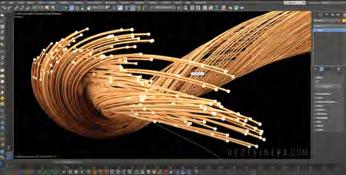
an earlier tyFlow version, but they have now been integrated into the new PRISM tyBoolean and tyMultifracture modifiers, as well as the Multifracture particle operator.
Despite the extensive reworking, PRISM doesn’t change the way that you use tyFlow. To test this out I went back to an older destruction tutorial and stepped through it but used the new ways rather than the legacy methods, and there was very little I had to change. I got better results faster and I could get more details. And I didn’t have to learn new workflows. This means that you can get complex results faster, with fewer crashes and a more streamlined workflow.
However, tyFLow 1.1 isn’t just about PRISM. Since the release back in January, there have been an uncountable number of additions and bug fixes across numerous operators and modifiers, including updates to the Terrain, VDB and Alembic importing and exporting. There is a cool pathfinding node that finds the shortest distance from a particle position to a destination across the surface of a mesh, which can be extrapolated into splines and then be modified with tySplines.
I am not overstating things by how much I believe tyFlow has changed the way artists work with 3ds Max — and by the look of it, Tyson doesn’t appear to be slowing down. You can look at the Trello of the road map to see what he has in store and how much he listens to the user base.
Website: pro.tyflow.com
Price: tyFlow: free; tyFlow Pro (node-locked): $495; tyFlow Pro (floating): $645 ◆
Todd Sheridan Perry is an award-winning vfx supervisor and digital artist whose many credits include I’m a Virgo, For All Mankind and Black Panther. He can be reached at teaspoonvfx.com.
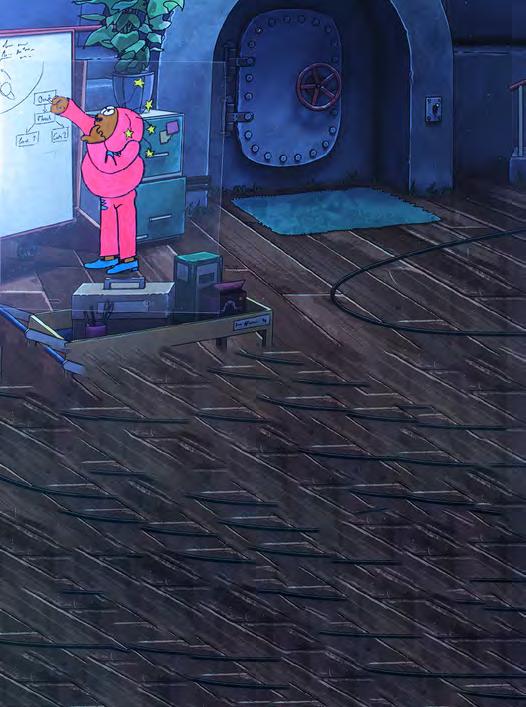
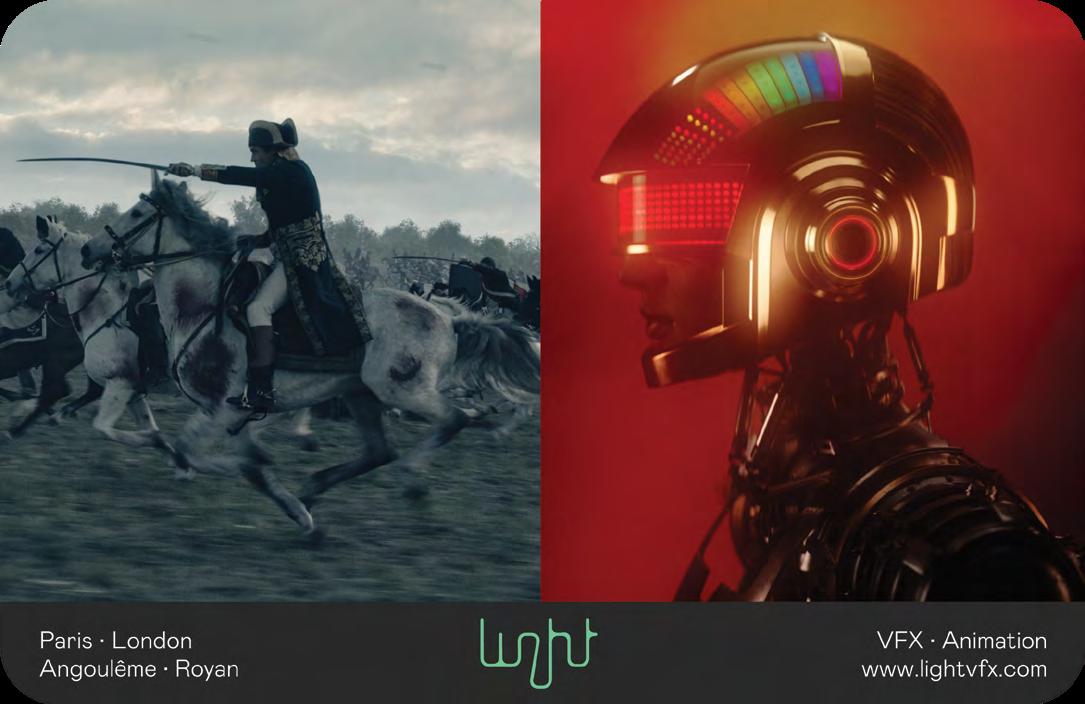
may 24 39 www.animationmagazine.net VFX & TECH
Low Cost Productions & No Budget Films Presents CIRESTE TWINKLE STUDIOS & LITTLE RED HEN PICTURES “TheWoodPeople” For more information: 508-648-4362 cirestetwinklestudiosbethnicholson.wordpress.com
This month, we are treated to a glimpse of a typical day in the life of fourtime Emmy-winning executive producer and Rough Draft partner/exec VP, the amazing Claudia Katz (Futurama).

1
First coffee of the day! So lucky my son is an excellent barista. Unfortunately he’s off to college soon!
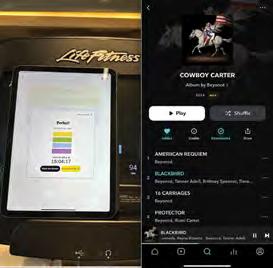
Connections at the gym

4
My dogs have arrived for some morning treats. I think I am stop no. 5 on the cookie circuit.
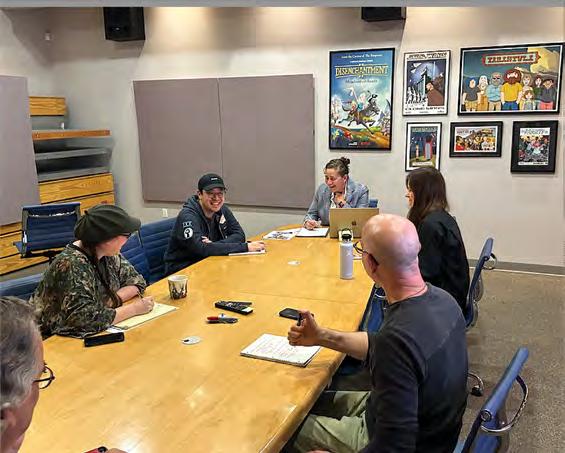
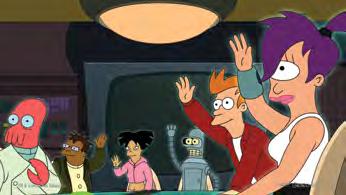
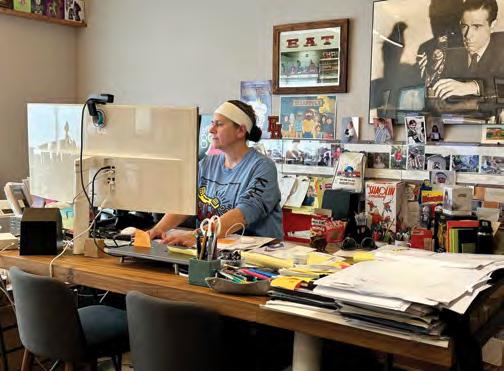
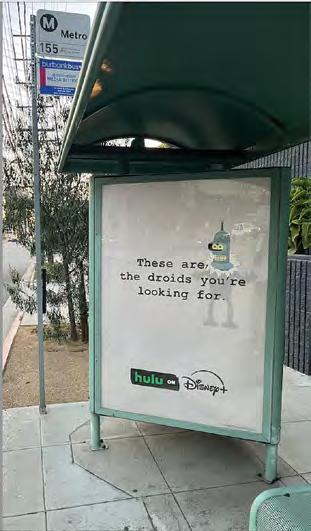
Checking emails in my gym clothes. Good thing we have showers at work!
Checking out our new billboard for the Hulu on Disney+ campaign. NOICE!

Getting ready for community lunch at Rough Draft — this week is pizza.
Our in-house development team hard at work. So lucky to get to work with this group (pictured from lower right, counter-clockwise around the table: Dwayne Carey-Hill, Alice Darrow, me, Andrew Han, Crystal ChesneyThompson, Peter Avanzino and Edmund Fong (not pictured). 8

It’s now 10 p.m., and I’m finally back home after some evening pickleball. Last email check before an episode of Behind the Attraction on Disney+!
www.animationmagazine.net 40 may 24
LIFE
A DAY IN THE
3
5 6
7
2
while listening to Beyonce´’s new album — which is FIRE!
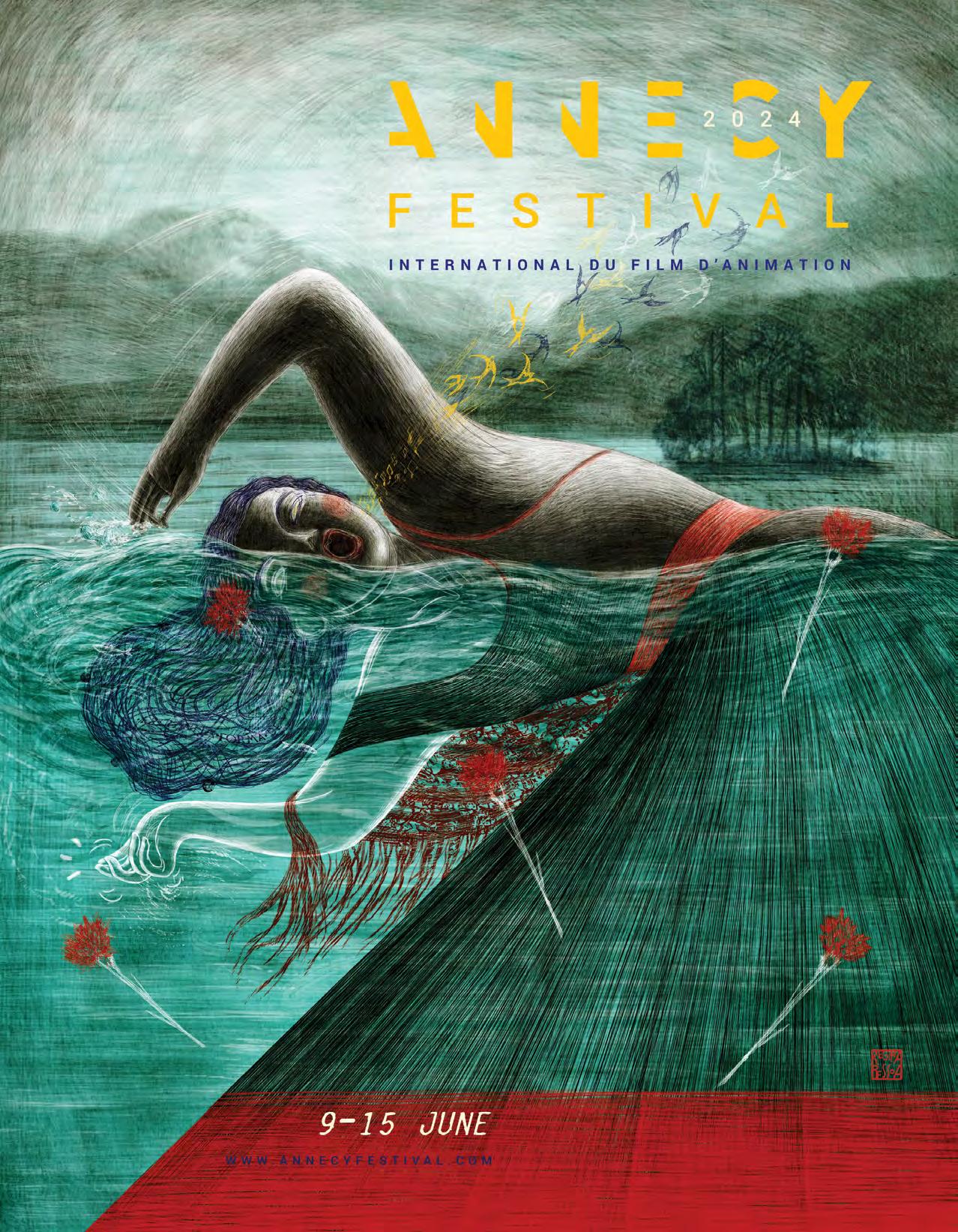
DATES DATES SAVE SAVE

the
NOVEMBER



















































































 Simon Crowe Managing Director, SC Films
Simon Crowe Managing Director, SC Films










































































